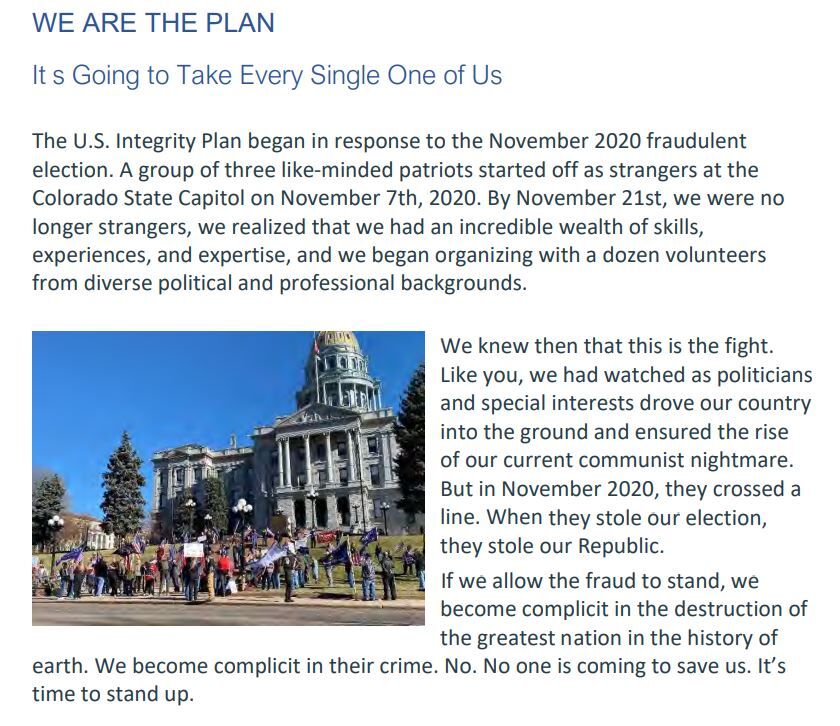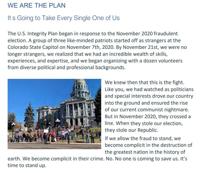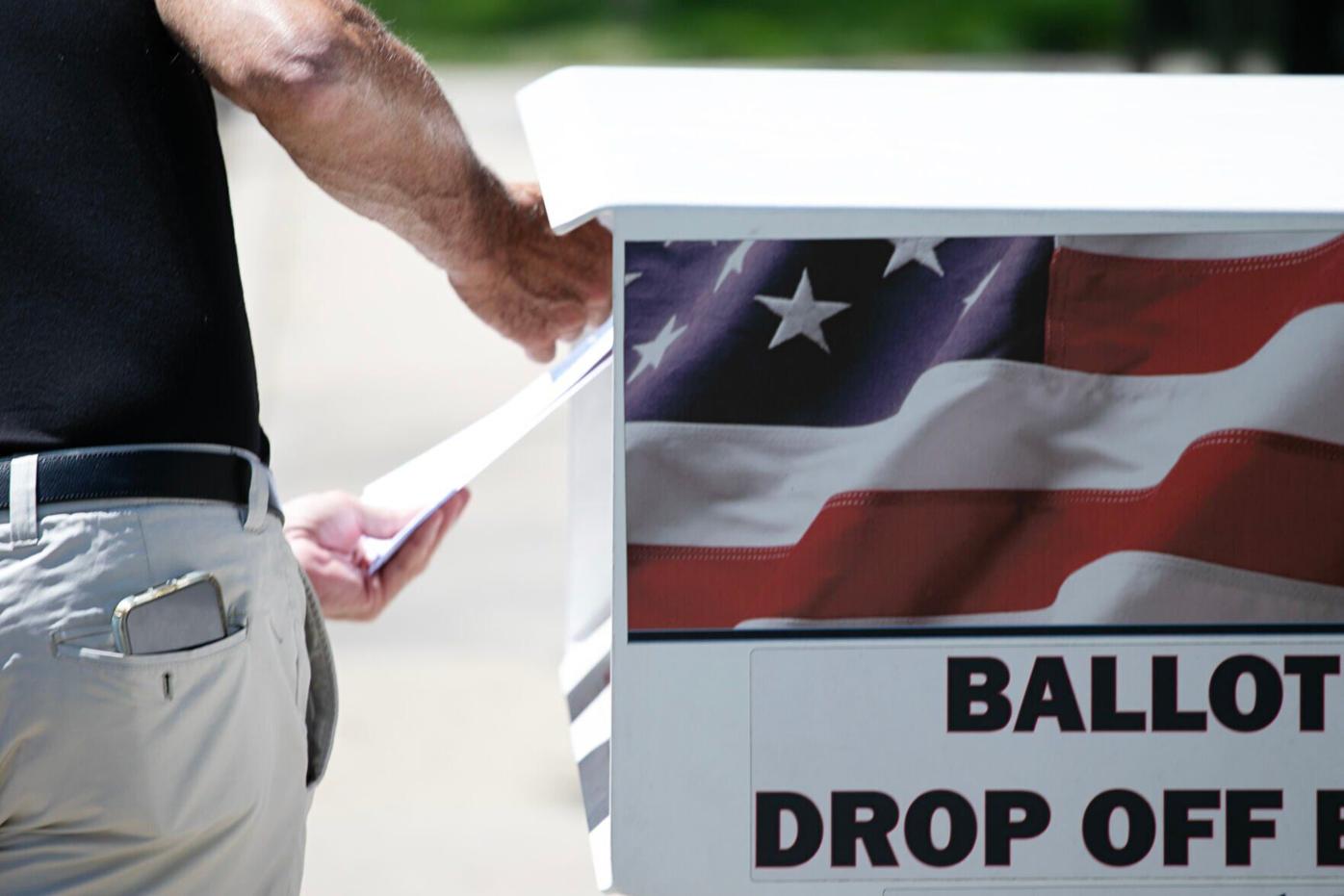Federal judge considers bringing early end to Colorado voter intimidation trial
After three full days of testimony, a federal judge will decide on Thursday morning whether three civic groups have proven their claims that the organizers of an “election integrity” initiative illegally intimidated voters in the wake of the 2020 presidential race with a door-to-door canvassing project seeking to uncover alleged election fraud.
The plaintiff groups — the Colorado Montana Wyoming State Area Conference of the NAACP, the League of Women Voters of Colorado, and Mi Familia Vota — sued the founders of U.S. Election Integrity Plan (USEIP), which was an organized effort following the 2020 election to visit voters at more than 9,400 homes to inquire about their registrations and past voting behavior.
The defendants characterized the canvassing effort as “the equivalent to a high school civics project,” but the plaintiffs maintained the purpose was not benign. They pointed to USEIP’s “playbook,” published in August 2021 at the tail end of the door-knocking project, which claimed “they stole our election” and warned about “the destruction of the greatest nation in the history of earth.”
Consequently, the plaintiff groups alleged such conduct by people who distrusted the results of the 2020 election amounted to prohibited voter intimidation under the Voting Rights Act and a conspiracy to intimidate voters under the Ku Klux Klan Act.

An excerpt from the August 2021 "playbook" published by U.S. Election Integrity Plan.


An excerpt from the August 2021 “playbook” published by U.S. Election Integrity Plan.
On Wednesday, the defendants — USEIP leaders Shawn Smith, Holly Kasun and Ashley Epp — asked U.S. District Court Judge Charlotte N. Sweeney to end the case in their favor at the close of the plaintiffs’ evidence.
There were “no admissions or statements that he did anything as it relates to intimidation,” said R. Scott Reisch, the attorney for Smith. “In fact, I think the evidence is quite to the contrary. They took great steps to make sure no one was intimidated. If you were going to intimidate somebody — you were going to be a ragtag group, so to speak, of vigilantes — you’re not gonna write a procedure and training manual.”
The plaintiffs countered they only needed to show under the Voting Rights Act that the defendants caused or could have caused any voter to feel intimidated, threatened or coerced. As the ringleaders of the effort to deploy canvassers to interrogate voters, the defendants’ conduct had been objectively intimidating, the groups argued.
“This is fundamentally different than the canvassing we see in connection with political campaigns and in connection with ballot initiatives and get-out-the-vote efforts,” said attorney Amy Erickson. “Defendants have presented an incredibly sanitized version of the canvassing activities they admittedly organized and engaged in.”
Sweeney cautioned the parties midday Wednesday that testimony was “drifting into other matters” and that some topics “may not be necessary” if she grants the defendants’ motion.
Previously, Sweeney heard testimony from a Grand Junction voter, Yvette Roberts, who felt intimidated after two canvassers came to her home in June 2021 to ask about the number of people in her house and how she submitted her ballot. On cross-examination, however, Roberts admitted she could not be sure the canvassers were affiliated with USEIP, contrary to her written declaration to the court.
Beth Hendrix, executive director of the League of Women Voters of Colorado, underwent cross-examination on Tuesday and Wednesday, repeatedly saying she relied on media reports of intimidation to form her understanding of USEIP’s work.
“Did you find it odd, given your work with misinformation, that there was not a single intimidated voter identified?” asked Epp, who is representing herself at trial.
“I believe people who are intimidated don’t tend to come forward,” Hendrix replied.
The defendants continuously suggested Hendrix failed to perform due diligence by relying on reporting from the Colorado Times Recorder and other outlets, which broadcasted USEIP’s plans to search for election fraud and take pictures of voters’ homes. After a string of questions about the wisdom of Hendrix’s reliance on news reports, Sweeney intervened.
“We’ve explored this ad nauseum,” she said. “It seems as if we are venturing into a different area other than the plaintiffs’ case.”

The Alfred A. Arraj U.S. Courthouse in Denver
Timothy Hurst, the denver Gazette file


The Alfred A. Arraj U.S. Courthouse in Denver
Timothy Hurst, the denver Gazette file
The plaintiffs also presented the expert testimony of Atiba Ellis, a law professor at Case Western Reserve University, who spoke about historical forms of voter intimidation and the modern manifestations of it.
“Would you characterize defendants as a voter vigilante group?” asked Erickson.
“Given these calls to opposing the ‘stolen’ election, and then what came off to me as rallying people to organize and get involved in that sort of activity,” he said, “and given what I read of their organization through canvassing and approaching the homes of Coloradans, I think that would meet my view of what a voter vigilante group is.”
Ellis clarified USEIP’s canvassing was “not the grand marches of the Ku Klux Klan,” but he saw parallels to past efforts of private groups to “police elections” without government authorization — particularly those targeting voters of color.
“You’re not accusing Mr. Smith of being a racist are you?” Reisch asked on cross-examination.
“No, sir,” Ellis responded.
“Because he has two stepchildren who are mixed-race, African American,” Reisch added before Sweeney sustained an objection.
The trial will continue Thursday.
The case is Colorado Montana Wyoming State Area Conference of the NAACP et al. v. Smith et al.
Denver News, Sports & Business | Denver Gazette
Amid summer doldrums, Denver housing market sees prices drop
Mark Samuelson
mark-samuelson@midtc.com
Updated 3 days ago
1 of 4A home in Greenwood Village that sold over list price last month. “The ones in good shape are getting picked off,” said listing agent Jennifer Markus. Credit Kentwood DTCKentwood DTC2 of 4A home in Greenwood Village that sold...
Mark Samuelson
Reporter
Denver News, Sports & Business | Denver Gazette
With help from two veterans, improvement of Broncos linebacker Levelle Bailey has been ‘night and day’
Chris Tomasson
chris-tomasson@midtc.com
Updated 1 week ago
1 of 2Broncos linebacker Levelle Bailey after training camp practice on Friday, Aug. 1 at Broncos Park in Englewood. (Chris Tomasson/The Denver Gazette)Chris Tomasson chris.tomasson@gazette.com2 of 2Denver Broncos linebacker Levelle Bailey (56) during the second half of an NFL football...
Chris Tomasson
Reporter
Denver News, Sports & Business | Denver Gazette
PHOTOS: Broncos Training Camp Week 2
Stephen Swofford
stephen-swofford@midtc.com
Updated 1 week ago
[inline_gallery image_url=”aHR0cHM6Ly9ibG94aW1hZ2VzLm5ld3lvcmsxLnZpcC50b3dubmV3cy5jb20vZGVudmVyZ2F6ZXR0ZS5jb20vY29udGVudC90bmNtcy9hc3NldHMvdjMvZWRpdG9yaWFsLzEvMzEvMTMxZDkzM2MtNGY5NS00Y2YzLTg4ZmItODRjODhkYzAyOGI3LzY4OGQxY2VjYWZkNDMuaW1hZ2UuanBn” caption_text=”PHNwYW4gY2xhc3M9ImNhcHRpb24tdGV4dCI+CjxwPkJyb25jb3MgVGlnaHQgRW5kIEx1Y2FzIEtydWxsIHdhcm1zIHVwIGJlZm9yZSB0aGUgc3RhcnQgb2YgcHJhY3RpY2UgZHVyaW5nIEJyb25jb3MgdHJhaW5pbmcgY2FtcCBvbiBGcmlkYXksIEF1Zy4gMSwgMjAyNSAoU3RlcGhlbiBTd29mZm9yZCwgRGVudmVyIEdhemV0dGUpPC9wPgo8L3NwYW4+CjxzcGFuIGNsYXNzPSJjcmVkaXQiPgo8c3BhbiBjbGFzcz0idG50LWJ5bGluZSBhc3NldC1ieWxpbmUiIGlkPSJhdXRob3ItODJiNjU3YWEtMTkyNC0xMWVmLWE1MDgtOGJmYzUyMDJmNzEzLWFzc2V0LTEzMWQ5MzNjLTRmOTUtNGNmMy04OGZiLTg0Yzg4ZGMwMjhiNyI+PGEgaHJlZj0iaHR0cHM6Ly9kZW52ZXJnYXpldHRlLmNvbS91c2Vycy9wcm9maWxlL1N0ZXBoZW4lMjBTd29mZm9yZCIgcmVsPSJhdXRob3IiPlN0ZXBoZW4gU3dvZmZvcmQ8L2E+PC9zcGFuPgo8L3NwYW4+CjxzcGFuIGNsYXNzPSJjbGVhcmZpeCI+PC9zcGFuPg==”] [inline_gallery image_url=”aHR0cHM6Ly9ibG94aW1hZ2VzLm5ld3lvcmsxLnZpcC50b3dubmV3cy5jb20vZGVudmVyZ2F6ZXR0ZS5jb20vY29udGVudC90bmNtcy9hc3NldHMvdjMvZWRpdG9yaWFsLzEvMzMvMTMzZGUzOGMtMjRjNy00ODU1LTgwNTMtMmFiOTlhYmQ1N2FkLzY4OGQxY2M5NTlkNGQuaW1hZ2UuanBn” caption_text=”PHNwYW4gY2xhc3M9ImNhcHRpb24tdGV4dCI+CjxwPk5ld2x5IHNpZ25lZCBCcm9uY29zIExpbmViYWNrZXIgR2FycmV0dCBOZWxzb24gc3RyZXRjaGVzIGJlZm9yZSB0aGUgc3RhcnQgb2YgcHJhY3RpY2UgZHVyaW5nIEJyb25jb3MgVHJhaW5pbmcgQ2FtcCBvbiBUaHVyc2RheSwgSnVseSAzMSwgMjAyNS4gKFN0ZXBoZW4gU3dvZmZvcmQsIERlbnZlciBHYXpldHRlKTwvcD4KPC9zcGFuPgo8c3BhbiBjbGFzcz0iY3JlZGl0Ij4KPHNwYW4gY2xhc3M9InRudC1ieWxpbmUgYXNzZXQtYnlsaW5lIiBpZD0iYXV0aG9yLTgyYjY1N2FhLTE5MjQtMTFlZi1hNTA4LThiZmM1MjAyZjcxMy1hc3NldC0xMzNkZTM4Yy0yNGM3LTQ4NTUtODA1My0yYWI5OWFiZDU3YWQiPjxhIGhyZWY9Imh0dHBzOi8vZGVudmVyZ2F6ZXR0ZS5jb20vdXNlcnMvcHJvZmlsZS9TdGVwaGVuJTIwU3dvZmZvcmQiIHJlbD0iYXV0aG9yIj5TdGVwaGVuIFN3b2Zmb3JkPC9hPjwvc3Bhbj4KPC9zcGFuPgo8c3BhbiBjbGFzcz0iY2xlYXJmaXgiPjwvc3Bhbj4=”] [inline_gallery image_url=”aHR0cHM6Ly9ibG94aW1hZ2VzLm5ld3lvcmsxLnZpcC50b3dubmV3cy5jb20vZGVudmVyZ2F6ZXR0ZS5jb20vY29udGVudC90bmNtcy9hc3NldHMvdjMvZWRpdG9yaWFsLzMvOWQvMzlkNTEyY2YtYmQ0ZS00ZWJmLTg2NDItNTU3M2YxMGU4MmVlLzY4OGQxY2ZlNjZmNjcuaW1hZ2UuanBn” caption_text=”PHNwYW4gY2xhc3M9ImNhcHRpb24tdGV4dCI+CjxwPkJyb25jb3MgU2FmZXR5IEJyYW5kb24gSm9uZXMgc3RyZXRjaGVzIGR1cmluZyB3YXJtIHVwcyBhdCBCcm9uY29zIHRyYWluaW5nIGNhbXAgb24gRnJpZGF5LCBBdWcuIDEsIDIwMjUgKFN0ZXBoZW4gU3dvZmZvcmQsIERlbnZlciBHYXpldHRlKTwvcD4KPC9zcGFuPgo8c3BhbiBjbGFzcz0iY3JlZGl0Ij4KPHNwYW4gY2xhc3M9InRudC1ieWxpbmUgYXNzZXQtYnlsaW5lIiBpZD0iYXV0aG9yLTgyYjY1N2FhLTE5MjQtMTFlZi1hNTA4LThiZmM1MjAyZjcxMy1hc3NldC0zOWQ1MTJjZi1iZDRlLTRlYmYtODY0Mi01NTczZjEwZTgyZWUiPjxhIGhyZWY9Imh0dHBzOi8vZGVudmVyZ2F6ZXR0ZS5jb20vdXNlcnMvcHJvZmlsZS9TdGVwaGVuJTIwU3dvZmZvcmQiIHJlbD0iYXV0aG9yIj5TdGVwaGVuIFN3b2Zmb3JkPC9hPjwvc3Bhbj4KPC9zcGFuPgo8c3BhbiBjbGFzcz0iY2xlYXJmaXgiPjwvc3Bhbj4=”] [inline_gallery image_url=”aHR0cHM6Ly9ibG94aW1hZ2VzLm5ld3lvcmsxLnZpcC50b3dubmV3cy5jb20vZGVudmVyZ2F6ZXR0ZS5jb20vY29udGVudC90bmNtcy9hc3NldHMvdjMvZWRpdG9yaWFsLzQvYzMvNGMzNjZkYjMtMGEwNy00NzJlLWJjYTQtMzM4MDBhNDcwMzYwLzY4OGQxZDFiYWZkNGYuaW1hZ2UuanBn” caption_text=”PHNwYW4gY2xhc3M9ImNhcHRpb24tdGV4dCI+CjxwPkJyb25jb3MgU2FmZXR5IFRhbGFub2EgSHVmYW5nYSBwdXRzIG9uIGhpcyBoZWxtZXQgYWZ0ZXIgd2FybSB1cHMgZHVyaW5nIEJyb25jb3MgdHJhaW5pbmcgY2FtcCBvbiBGcmlkYXksIEF1Zy4gMSwgMjAyNSAoU3RlcGhlbiBTd29mZm9yZCwgRGVudmVyIEdhemV0dGUpPC9wPgo8L3NwYW4+CjxzcGFuIGNsYXNzPSJjcmVkaXQiPgo8c3BhbiBjbGFzcz0idG50LWJ5bGluZSBhc3NldC1ieWxpbmUiIGlkPSJhdXRob3ItODJiNjU3YWEtMTkyNC0xMWVmLWE1MDgtOGJmYzUyMDJmNzEzLWFzc2V0LTRjMzY2ZGIzLTBhMDctNDcyZS1iY2E0LTMzODAwYTQ3MDM2MCI+PGEgaHJlZj0iaHR0cHM6Ly9kZW52ZXJnYXpldHRlLmNvbS91c2Vycy9wcm9maWxlL1N0ZXBoZW4lMjBTd29mZm9yZCIgcmVsPSJhdXRob3IiPlN0ZXBoZW4gU3dvZmZvcmQ8L2E+PC9zcGFuPgo8L3NwYW4+CjxzcGFuIGNsYXNzPSJjbGVhcmZpeCI+PC9zcGFuPg==”] [inline_gallery image_url=”aHR0cHM6Ly9ibG94aW1hZ2VzLm5ld3lvcmsxLnZpcC50b3dubmV3cy5jb20vZGVudmVyZ2F6ZXR0ZS5jb20vY29udGVudC90bmNtcy9hc3NldHMvdjMvZWRpdG9yaWFsLzYvMjIvNjIyNmFlYmItZmIxZS00ZTQ4LWFlNjUtOGE1OTdmM2M3NTMyLzY4OGQxY2IxYTlmMmIuaW1hZ2UuanBn” caption_text=”PHNwYW4gY2xhc3M9ImNhcHRpb24tdGV4dCI+CjxwPkJyb25jb3MgV2lkZSBSZWNlaXZlciBLeXJlc2UgV2hpdGUgY2F0Y2hlcyBhIGJhbGwgYXMgaGUgd2FybXMgdXAgYmVmb3JlIHRoZSBzdGFydCBvZiBwcmFjdGljZSBkdXJpbmcgQnJvbmNvcyBUcmFpbmluZyBDYW1wIG9uIFRodXJzZGF5LCBKdWx5IDMxLCAyMDI1IChTdGVwaGVuIFN3b2Zmb3JkLCBEZW52ZXIgR2F6ZXR0ZSk8L3A+Cjwvc3Bhbj4KPHNwYW4gY2xhc3M9ImNyZWRpdCI+CjxzcGFuIGNsYXNzPSJ0bnQtYnlsaW5lIGFzc2V0LWJ5bGluZSIgaWQ9ImF1dGhvci04MmI2NTdhYS0xOTI0LTExZWYtYTUwOC04YmZjNTIwMmY3MTMtYXNzZXQtNjIyNmFlYmItZmIxZS00ZTQ4LWFlNjUtOGE1OTdmM2M3NTMyIj48YSBocmVmPSJodHRwczovL2RlbnZlcmdhemV0dGUuY29tL3VzZXJzL3Byb2ZpbGUvU3RlcGhlbiUyMFN3b2Zmb3JkIiByZWw9ImF1dGhvciI+U3RlcGhlbiBTd29mZm9yZDwvYT48L3NwYW4+Cjwvc3Bhbj4KPHNwYW4gY2xhc3M9ImNsZWFyZml4Ij48L3NwYW4+”] [inline_gallery image_url=”aHR0cHM6Ly9ibG94aW1hZ2VzLm5ld3lvcmsxLnZpcC50b3dubmV3cy5jb20vZGVudmVyZ2F6ZXR0ZS5jb20vY29udGVudC90bmNtcy9hc3NldHMvdjMvZWRpdG9yaWFsLzYvZDEvNmQxNmZlNDUtOTE5MC00ZDg5LTlkOGYtZWU0ZDlhMjNlMjQ0LzY4OGQxZDA5MjkxNDEuaW1hZ2UuanBn” caption_text=”PHNwYW4gY2xhc3M9ImNhcHRpb24tdGV4dCI+CjxwPkJyb25jb3MgV2lkZSBSZWNlaXZlciBUcmVudCBTaGVyZmllbGQgU3IuIG1pc3NlcyBhIGNhdGNoIGR1cmluZyBCcm9uY29zIHRyYWluaW5nIGNhbXAgb24gRnJpZGF5LCBBdWcuIDEsIDIwMjUgKFN0ZXBoZW4gU3dvZmZvcmQsIERlbnZlciBHYXpldHRlKTwvcD4KPC9zcGFuPgo8c3BhbiBjbGFzcz0iY3JlZGl0Ij4KPHNwYW4gY2xhc3M9InRudC1ieWxpbmUgYXNzZXQtYnlsaW5lIiBpZD0iYXV0aG9yLTgyYjY1N2FhLTE5MjQtMTFlZi1hNTA4LThiZmM1MjAyZjcxMy1hc3NldC02ZDE2ZmU0NS05MTkwLTRkODktOWQ4Zi1lZTRkOWEyM2UyNDQiPjxhIGhyZWY9Imh0dHBzOi8vZGVudmVyZ2F6ZXR0ZS5jb20vdXNlcnMvcHJvZmlsZS9TdGVwaGVuJTIwU3dvZmZvcmQiIHJlbD0iYXV0aG9yIj5TdGVwaGVuIFN3b2Zmb3JkPC9hPjwvc3Bhbj4KPC9zcGFuPgo8c3BhbiBjbGFzcz0iY2xlYXJmaXgiPjwvc3Bhbj4=”] [inline_gallery image_url=”aHR0cHM6Ly9ibG94aW1hZ2VzLm5ld3lvcmsxLnZpcC50b3dubmV3cy5jb20vZGVudmVyZ2F6ZXR0ZS5jb20vY29udGVudC90bmNtcy9hc3NldHMvdjMvZWRpdG9yaWFsLzcvOTIvNzkyOGVkNTktZmM3Ny00YjdiLWE2ZmItMjBkYzI4MGQ4YTYyLzY4OGQxY2YxZDA0ZGMuaW1hZ2UuanBn” caption_text=”PHNwYW4gY2xhc3M9ImNhcHRpb24tdGV4dCI+CjxwPkJyb25jb3MgSW5zaWRlIExpbmViYWNrZXIgSnVzdGluIFN0cm5hZCBzdHJldGNoZXMgZHVyaW5nIHdhcm0gdXBzIGF0IEJyb25jb3MgdHJhaW5pbmcgY2FtcCBvbiBGcmlkYXksIEF1Zy4gMSwgMjAyNSAoU3RlcGhlbiBTd29mZm9yZCwgRGVudmVyIEdhemV0dGUpPC9wPgo8L3NwYW4+CjxzcGFuIGNsYXNzPSJjcmVkaXQiPgo8c3BhbiBjbGFzcz0idG50LWJ5bGluZSBhc3NldC1ieWxpbmUiIGlkPSJhdXRob3ItODJiNjU3YWEtMTkyNC0xMWVmLWE1MDgtOGJmYzUyMDJmNzEzLWFzc2V0LTc5MjhlZDU5LWZjNzctNGI3Yi1hNmZiLTIwZGMyODBkOGE2MiI+PGEgaHJlZj0iaHR0cHM6Ly9kZW52ZXJnYXpldHRlLmNvbS91c2Vycy9wcm9maWxlL1N0ZXBoZW4lMjBTd29mZm9yZCIgcmVsPSJhdXRob3IiPlN0ZXBoZW4gU3dvZmZvcmQ8L2E+PC9zcGFuPgo8L3NwYW4+CjxzcGFuIGNsYXNzPSJjbGVhcmZpeCI+PC9zcGFuPg==”] [inline_gallery image_url=”aHR0cHM6Ly9ibG94aW1hZ2VzLm5ld3lvcmsxLnZpcC50b3dubmV3cy5jb20vZGVudmVyZ2F6ZXR0ZS5jb20vY29udGVudC90bmNtcy9hc3NldHMvdjMvZWRpdG9yaWFsLzcvYjcvN2I3YjA0NTItNGEzNC00NzNjLTkwNDItZDA4MmNhYzUwYTgwLzY4OGQxZDNjMTIzNWMuaW1hZ2UuanBn” caption_text=”PHNwYW4gY2xhc3M9ImNhcHRpb24tdGV4dCI+CjxwPkJyb25jb3MgTGluZWJhY2tlciBEcmUgR3JlZW5sYXcgcnVucyBkcmlsbHMgZHVyaW5nIEJyb25jb3MgdHJhaW5pbmcgY2FtcCBvbiBGcmlkYXksIEF1Zy4gMSwgMjAyNSAoU3RlcGhlbiBTd29mZm9yZCwgRGVudmVyIEdhemV0dGUpPC9wPgo8L3NwYW4+CjxzcGFuIGNsYXNzPSJjcmVkaXQiPgo8c3BhbiBjbGFzcz0idG50LWJ5bGluZSBhc3NldC1ieWxpbmUiIGlkPSJhdXRob3ItODJiNjU3YWEtMTkyNC0xMWVmLWE1MDgtOGJmYzUyMDJmNzEzLWFzc2V0LTdiN2IwNDUyLTRhMzQtNDczYy05MDQyLWQwODJjYWM1MGE4MCI+PGEgaHJlZj0iaHR0cHM6Ly9kZW52ZXJnYXpldHRlLmNvbS91c2Vycy9wcm9maWxlL1N0ZXBoZW4lMjBTd29mZm9yZCIgcmVsPSJhdXRob3IiPlN0ZXBoZW4gU3dvZmZvcmQ8L2E+PC9zcGFuPgo8L3NwYW4+CjxzcGFuIGNsYXNzPSJjbGVhcmZpeCI+PC9zcGFuPg==”] [inline_gallery image_url=”aHR0cHM6Ly9ibG94aW1hZ2VzLm5ld3lvcmsxLnZpcC50b3dubmV3cy5jb20vZGVudmVyZ2F6ZXR0ZS5jb20vY29udGVudC90bmNtcy9hc3NldHMvdjMvZWRpdG9yaWFsLzkvOTAvOTkwMGY5NmItYTYxYy00NGM4LWFhMDQtZDUzMjZhMGNlMDcxLzY4OGQxY2Y4YzVhZGIuaW1hZ2UuanBn” caption_text=”PHNwYW4gY2xhc3M9ImNhcHRpb24tdGV4dCI+CjxwPkJyb25jb3MgRGVmZW5zaXZlIFRhY2tsZSBLcmlzdGlhbiBXaWxsaWFtcyBoeXBlcyB1cCB0aGUgY3Jvd2QgZHVyaW5nIEJyb25jb3MgdHJhaW5pbmcgY2FtcCBvbiBGcmlkYXksIEF1Zy4gMSwgMjAyNSAoU3RlcGhlbiBTd29mZm9yZCwgRGVudmVyIEdhemV0dGUpPC9wPgo8L3NwYW4+CjxzcGFuIGNsYXNzPSJjcmVkaXQiPgo8c3BhbiBjbGFzcz0idG50LWJ5bGluZSBhc3NldC1ieWxpbmUiIGlkPSJhdXRob3ItODJiNjU3YWEtMTkyNC0xMWVmLWE1MDgtOGJmYzUyMDJmNzEzLWFzc2V0LTk5MDBmOTZiLWE2MWMtNDRjOC1hYTA0LWQ1MzI2YTBjZTA3MSI+PGEgaHJlZj0iaHR0cHM6Ly9kZW52ZXJnYXpldHRlLmNvbS91c2Vycy9wcm9maWxlL1N0ZXBoZW4lMjBTd29mZm9yZCIgcmVsPSJhdXRob3IiPlN0ZXBoZW4gU3dvZmZvcmQ8L2E+PC9zcGFuPgo8L3NwYW4+CjxzcGFuIGNsYXNzPSJjbGVhcmZpeCI+PC9zcGFuPg==”] [inline_gallery image_url=”aHR0cHM6Ly9ibG94aW1hZ2VzLm5ld3lvcmsxLnZpcC50b3dubmV3cy5jb20vZGVudmVyZ2F6ZXR0ZS5jb20vY29udGVudC90bmNtcy9hc3NldHMvdjMvZWRpdG9yaWFsLzkvYzQvOWM0NTUzMjEtZGMyZS00YTQwLTlhYjktZjZlOGQ3ZDJiZDhjLzY4OGQxZDA0NDA2MzguaW1hZ2UuanBn” caption_text=”PHNwYW4gY2xhc3M9ImNhcHRpb24tdGV4dCI+CjxwPkJyb25jb3MgT2ZmZW5zaXZlIExpbmViYWNrZXIgTmlrIEJvbml0dG8gcnVucyBkcmlsbHMgZHVyaW5nIEJyb25jb3MgdHJhaW5pbmcgY2FtcCBvbiBGcmlkYXksIEF1Zy4gMSwgMjAyNSAoU3RlcGhlbiBTd29mZm9yZCwgRGVudmVyIEdhemV0dGUpPC9wPgo8L3NwYW4+CjxzcGFuIGNsYXNzPSJjcmVkaXQiPgo8c3BhbiBjbGFzcz0idG50LWJ5bGluZSBhc3NldC1ieWxpbmUiIGlkPSJhdXRob3ItODJiNjU3YWEtMTkyNC0xMWVmLWE1MDgtOGJmYzUyMDJmNzEzLWFzc2V0LTljNDU1MzIxLWRjMmUtNGE0MC05YWI5LWY2ZThkN2QyYmQ4YyI+PGEgaHJlZj0iaHR0cHM6Ly9kZW52ZXJnYXpldHRlLmNvbS91c2Vycy9wcm9maWxlL1N0ZXBoZW4lMjBTd29mZm9yZCIgcmVsPSJhdXRob3IiPlN0ZXBoZW4gU3dvZmZvcmQ8L2E+PC9zcGFuPgo8L3NwYW4+CjxzcGFuIGNsYXNzPSJjbGVhcmZpeCI+PC9zcGFuPg==”] [inline_gallery image_url=”aHR0cHM6Ly9ibG94aW1hZ2VzLm5ld3lvcmsxLnZpcC50b3dubmV3cy5jb20vZGVudmVyZ2F6ZXR0ZS5jb20vY29udGVudC90bmNtcy9hc3NldHMvdjMvZWRpdG9yaWFsL2EvMDYvYTA2MTdiMDAtODFhZi00YmIxLWE3MjUtMGNjNmZmMWEyZmE4LzY4OGQxZDM3Mzc3ODIuaW1hZ2UuanBn” caption_text=”PHNwYW4gY2xhc3M9ImNhcHRpb24tdGV4dCI+CjxwPkJyb25jb3MgRGVmZW5zaXZlIGxpbmVtYW4gRXlpb21hIFV3YXp1cmlrZSBydW5zIGRyaWxscyBkdXJpbmcgQnJvbmNvcyB0cmFpbmluZyBjYW1wIG9uIEZyaWRheSwgQXVnLiAxLCAyMDI1IChTdGVwaGVuIFN3b2Zmb3JkLCBEZW52ZXIgR2F6ZXR0ZSk8L3A+Cjwvc3Bhbj4KPHNwYW4gY2xhc3M9ImNyZWRpdCI+CjxzcGFuIGNsYXNzPSJ0bnQtYnlsaW5lIGFzc2V0LWJ5bGluZSIgaWQ9ImF1dGhvci04MmI2NTdhYS0xOTI0LTExZWYtYTUwOC04YmZjNTIwMmY3MTMtYXNzZXQtYTA2MTdiMDAtODFhZi00YmIxLWE3MjUtMGNjNmZmMWEyZmE4Ij48YSBocmVmPSJodHRwczovL2RlbnZlcmdhemV0dGUuY29tL3VzZXJzL3Byb2ZpbGUvU3RlcGhlbiUyMFN3b2Zmb3JkIiByZWw9ImF1dGhvciI+U3RlcGhlbiBTd29mZm9yZDwvYT48L3NwYW4+Cjwvc3Bhbj4KPHNwYW4gY2xhc3M9ImNsZWFyZml4Ij48L3NwYW4+”] [inline_gallery image_url=”aHR0cHM6Ly9ibG94aW1hZ2VzLm5ld3lvcmsxLnZpcC50b3dubmV3cy5jb20vZGVudmVyZ2F6ZXR0ZS5jb20vY29udGVudC90bmNtcy9hc3NldHMvdjMvZWRpdG9yaWFsL2EvYjQvYWI0MzFhMTktNGNkZi00ZTEyLTlkMTUtZGYwMmZkZDMwMjJmLzY4OGQxY2FlNTY0Y2UuaW1hZ2UuanBn” caption_text=”PHNwYW4gY2xhc3M9ImNhcHRpb24tdGV4dCI+CjxwPkNvbnN0cnVjdGlvbiBjcmV3cyBsb3dlciB0aGUgbGFzdCByb29mIHBhbmVsIGludG8gcGxhY2Ugb24gdGhlIG5ldyBicm9uY29zIHRyYWluaW5nIGZhY2lsaXR5IGR1cmluZyBhIGNlcmVtb255IG9uIEZyaWRheSwgQXVnLiAxLCAyMDI1IChTdGVwaGVuIFN3b2Zmb3JkLCBEZW52ZXIgR2F6ZXR0ZSk8L3A+Cjwvc3Bhbj4KPHNwYW4gY2xhc3M9ImNyZWRpdCI+CjxzcGFuIGNsYXNzPSJ0bnQtYnlsaW5lIGFzc2V0LWJ5bGluZSIgaWQ9ImF1dGhvci04MmI2NTdhYS0xOTI0LTExZWYtYTUwOC04YmZjNTIwMmY3MTMtYXNzZXQtYWI0MzFhMTktNGNkZi00ZTEyLTlkMTUtZGYwMmZkZDMwMjJmIj48YSBocmVmPSJodHRwczovL2RlbnZlcmdhemV0dGUuY29tL3VzZXJzL3Byb2ZpbGUvU3RlcGhlbiUyMFN3b2Zmb3JkIiByZWw9ImF1dGhvciI+U3RlcGhlbiBTd29mZm9yZDwvYT48L3NwYW4+Cjwvc3Bhbj4KPHNwYW4gY2xhc3M9ImNsZWFyZml4Ij48L3NwYW4+”] [inline_gallery image_url=”aHR0cHM6Ly9ibG94aW1hZ2VzLm5ld3lvcmsxLnZpcC50b3dubmV3cy5jb20vZGVudmVyZ2F6ZXR0ZS5jb20vY29udGVudC90bmNtcy9hc3NldHMvdjMvZWRpdG9yaWFsL2QvZTUvZGU1Y2Y1ODEtMTgwMy00YWRjLTkyODEtMzRhMTM1MGFjODU0LzY4OGQxZDE2N2IxNGQuaW1hZ2UuanBn” caption_text=”PHNwYW4gY2xhc3M9ImNhcHRpb24tdGV4dCI+CjxwPkJyb25jb3MgQ2VudGVyIEx1a2UgV2F0dGVuYmVyZywgbGVmdCwgYW5kIEd1YXJkIENsYXkgV2ViYiBydW4gYSBkcmlsbCBkdXJpbmcgQnJvbmNvcyB0cmFpbmluZyBjYW1wIG9uIEZyaWRheSwgQXVnLiAxLCAyMDI1IChTdGVwaGVuIFN3b2Zmb3JkLCBEZW52ZXIgR2F6ZXR0ZSk8L3A+Cjwvc3Bhbj4KPHNwYW4gY2xhc3M9ImNyZWRpdCI+CjxzcGFuIGNsYXNzPSJ0bnQtYnlsaW5lIGFzc2V0LWJ5bGluZSIgaWQ9ImF1dGhvci04MmI2NTdhYS0xOTI0LTExZWYtYTUwOC04YmZjNTIwMmY3MTMtYXNzZXQtZGU1Y2Y1ODEtMTgwMy00YWRjLTkyODEtMzRhMTM1MGFjODU0Ij48YSBocmVmPSJodHRwczovL2RlbnZlcmdhemV0dGUuY29tL3VzZXJzL3Byb2ZpbGUvU3RlcGhlbiUyMFN3b2Zmb3JkIiByZWw9ImF1dGhvciI+U3RlcGhlbiBTd29mZm9yZDwvYT48L3NwYW4+Cjwvc3Bhbj4KPHNwYW4gY2xhc3M9ImNsZWFyZml4Ij48L3NwYW4+”] [inline_gallery...
Stephen Swofford
Reporter
Denver News, Sports & Business | Denver Gazette
PHOTOS: Broncos invite fans to the stands for Training Camp
Stephen Swofford
stephen-swofford@midtc.com
Updated 2 weeks ago
[inline_gallery image_url=”aHR0cHM6Ly9ibG94aW1hZ2VzLm5ld3lvcmsxLnZpcC50b3dubmV3cy5jb20vZGVudmVyZ2F6ZXR0ZS5jb20vY29udGVudC90bmNtcy9hc3NldHMvdjMvZWRpdG9yaWFsLzQvYmUvNGJlNGRiMjMtMGNiMy00MDBiLTg1MGUtMGFjY2JmOGU1M2MzLzY4ODNmMDQ3NDk2YmEuaW1hZ2UuanBn” caption_text=”PHNwYW4gY2xhc3M9ImNhcHRpb24tdGV4dCI+CjxwPkJyb25jb3MgRGVmZW5zaXZlIFRhY2tsZSBLcmlzdGlhbiBXaWxsaWFtcyB0YWxrcyB3aXRoIGZhbnMgYXMgaGUgYXV0b2dyYXBocyBtZW1vcmFiaWxpYSBhZnRlciBwcmFjdGljZSBkdXJpbmcgdHJhaW5pbmcgY2FtcCBvbiBGcmlkYXksIEp1bHkgMjUsIDIwMjUuIChTdGVwaGVuIFN3b2Zmb3JkLCBEZW52ZXIgR2F6ZXR0ZSk8L3A+Cjwvc3Bhbj4KPHNwYW4gY2xhc3M9ImNyZWRpdCI+CjxzcGFuIGNsYXNzPSJ0bnQtYnlsaW5lIGFzc2V0LWJ5bGluZSIgaWQ9ImF1dGhvci04MmI2NTdhYS0xOTI0LTExZWYtYTUwOC04YmZjNTIwMmY3MTMtYXNzZXQtNGJlNGRiMjMtMGNiMy00MDBiLTg1MGUtMGFjY2JmOGU1M2MzIj48YSBocmVmPSJodHRwczovL2RlbnZlcmdhemV0dGUuY29tL3VzZXJzL3Byb2ZpbGUvU3RlcGhlbiUyMFN3b2Zmb3JkIiByZWw9ImF1dGhvciI+U3RlcGhlbiBTd29mZm9yZDwvYT48L3NwYW4+Cjwvc3Bhbj4KPHNwYW4gY2xhc3M9ImNsZWFyZml4Ij48L3NwYW4+”] [inline_gallery image_url=”aHR0cHM6Ly9ibG94aW1hZ2VzLm5ld3lvcmsxLnZpcC50b3dubmV3cy5jb20vZGVudmVyZ2F6ZXR0ZS5jb20vY29udGVudC90bmNtcy9hc3NldHMvdjMvZWRpdG9yaWFsLzUvNjAvNTYwNTZlZjQtNzI1Ni00NjIzLWFmZmQtNmY2NjY2ZmMyMGEwLzY4ODNmMDZkYTBkOGQuaW1hZ2UuanBn” caption_text=”PHNwYW4gY2xhc3M9ImNhcHRpb24tdGV4dCI+CjxwPkJyb25jb3MgUnVubmluZ2JhY2sgSmFsZWVsIE1jTGF1Z2hsaW4gY2F0Y2hlcyB0aGUgYmFsbCBhcyBoZSBydW5zIGRyaWxscyBkdXJpbmcgdHJhaW5pbmcgY2FtcCBvbiBGcmlkYXksIEp1bHkgMjUsIDIwMjUuIChTdGVwaGVuIFN3b2Zmb3JkLCBEZW52ZXIgR2F6ZXR0ZSk8L3A+Cjwvc3Bhbj4KPHNwYW4gY2xhc3M9ImNyZWRpdCI+CjxzcGFuIGNsYXNzPSJ0bnQtYnlsaW5lIGFzc2V0LWJ5bGluZSIgaWQ9ImF1dGhvci04MmI2NTdhYS0xOTI0LTExZWYtYTUwOC04YmZjNTIwMmY3MTMtYXNzZXQtNTYwNTZlZjQtNzI1Ni00NjIzLWFmZmQtNmY2NjY2ZmMyMGEwIj48YSBocmVmPSJodHRwczovL2RlbnZlcmdhemV0dGUuY29tL3VzZXJzL3Byb2ZpbGUvU3RlcGhlbiUyMFN3b2Zmb3JkIiByZWw9ImF1dGhvciI+U3RlcGhlbiBTd29mZm9yZDwvYT48L3NwYW4+Cjwvc3Bhbj4KPHNwYW4gY2xhc3M9ImNsZWFyZml4Ij48L3NwYW4+”] [inline_gallery image_url=”aHR0cHM6Ly9ibG94aW1hZ2VzLm5ld3lvcmsxLnZpcC50b3dubmV3cy5jb20vZGVudmVyZ2F6ZXR0ZS5jb20vY29udGVudC90bmNtcy9hc3NldHMvdjMvZWRpdG9yaWFsLzEvMjQvMTI0NTVlMTMtMmVkYi00OTgxLTg0MmYtMWZiM2UxNmM0MmE1LzY4ODNmMDdiNDFjNzguaW1hZ2UuanBn” caption_text=”PHNwYW4gY2xhc3M9ImNhcHRpb24tdGV4dCI+CjxwPkJyb25jb3MgUXVhcnRlcmJhY2sgQm8gTml4IHdhcm1zIHVwIHdpdGggdGhlIHRlYW0gZHVyaW5nIHRyYWluaW5nIGNhbXAgb24gRnJpZGF5LCBKdWx5IDI1LCAyMDI1LiAoU3RlcGhlbiBTd29mZm9yZCwgRGVudmVyIEdhemV0dGUpPC9wPgo8L3NwYW4+CjxzcGFuIGNsYXNzPSJjcmVkaXQiPgo8c3BhbiBjbGFzcz0idG50LWJ5bGluZSBhc3NldC1ieWxpbmUiIGlkPSJhdXRob3ItODJiNjU3YWEtMTkyNC0xMWVmLWE1MDgtOGJmYzUyMDJmNzEzLWFzc2V0LTEyNDU1ZTEzLTJlZGItNDk4MS04NDJmLTFmYjNlMTZjNDJhNSI+PGEgaHJlZj0iaHR0cHM6Ly9kZW52ZXJnYXpldHRlLmNvbS91c2Vycy9wcm9maWxlL1N0ZXBoZW4lMjBTd29mZm9yZCIgcmVsPSJhdXRob3IiPlN0ZXBoZW4gU3dvZmZvcmQ8L2E+PC9zcGFuPgo8L3NwYW4+CjxzcGFuIGNsYXNzPSJjbGVhcmZpeCI+PC9zcGFuPg==”] [inline_gallery image_url=”aHR0cHM6Ly9ibG94aW1hZ2VzLm5ld3lvcmsxLnZpcC50b3dubmV3cy5jb20vZGVudmVyZ2F6ZXR0ZS5jb20vY29udGVudC90bmNtcy9hc3NldHMvdjMvZWRpdG9yaWFsLzEvY2UvMWNlNzQ1ZTUtY2RhOS00YmRhLTgzMzgtZTg5MzA2MjQ4YzQ0LzY4ODNmMGEwZDYxZGYuaW1hZ2UuanBn” caption_text=”PHNwYW4gY2xhc3M9ImNhcHRpb24tdGV4dCI+CjxwPkJyb25jb3MgV2lkZSBSZWNlaXZlciBNYXJ2aW4gTWltcyBKci4gY2F0Y2hlcyB0aGUgYmFsbCBkdXJpbmcgYSBkcmlsbCBhdCBUcmFpbmluZyBDYW1wIG9uIEZyaWRheSwgSnVseSAyNSwgMjAyNS4gKFN0ZXBoZW4gU3dvZmZvcmQsIERlbnZlciBHYXpldHRlKTwvcD4KPC9zcGFuPgo8c3BhbiBjbGFzcz0iY3JlZGl0Ij4KPHNwYW4gY2xhc3M9InRudC1ieWxpbmUgYXNzZXQtYnlsaW5lIiBpZD0iYXV0aG9yLTgyYjY1N2FhLTE5MjQtMTFlZi1hNTA4LThiZmM1MjAyZjcxMy1hc3NldC0xY2U3NDVlNS1jZGE5LTRiZGEtODMzOC1lODkzMDYyNDhjNDQiPjxhIGhyZWY9Imh0dHBzOi8vZGVudmVyZ2F6ZXR0ZS5jb20vdXNlcnMvcHJvZmlsZS9TdGVwaGVuJTIwU3dvZmZvcmQiIHJlbD0iYXV0aG9yIj5TdGVwaGVuIFN3b2Zmb3JkPC9hPjwvc3Bhbj4KPC9zcGFuPgo8c3BhbiBjbGFzcz0iY2xlYXJmaXgiPjwvc3Bhbj4=”] [inline_gallery image_url=”aHR0cHM6Ly9ibG94aW1hZ2VzLm5ld3lvcmsxLnZpcC50b3dubmV3cy5jb20vZGVudmVyZ2F6ZXR0ZS5jb20vY29udGVudC90bmNtcy9hc3NldHMvdjMvZWRpdG9yaWFsLzIvMDcvMjA3ZmU2NjQtMzdmMy00M2FmLTk2ZmQtZTFlY2M0OWNkZTgzLzY4ODNmMDlhNmQyMTcuaW1hZ2UuanBn” caption_text=”PHNwYW4gY2xhc3M9ImNhcHRpb24tdGV4dCI+CjxwPkJyb25jb3MgRGVmZW5zaXZlIExpbmVtYW4gWmFjaCBBbGxlbiB3YXJtcyB1cCB3aXRoIHRoZSB0ZWFtIGR1cmluZyB0cmFpbmluZyBjYW1wIG9uIEZyaWRheSwgSnVseSAyNSwgMjAyNS4gKFN0ZXBoZW4gU3dvZmZvcmQsIERlbnZlciBHYXpldHRlKTwvcD4KPC9zcGFuPgo8c3BhbiBjbGFzcz0iY3JlZGl0Ij4KPHNwYW4gY2xhc3M9InRudC1ieWxpbmUgYXNzZXQtYnlsaW5lIiBpZD0iYXV0aG9yLTgyYjY1N2FhLTE5MjQtMTFlZi1hNTA4LThiZmM1MjAyZjcxMy1hc3NldC0yMDdmZTY2NC0zN2YzLTQzYWYtOTZmZC1lMWVjYzQ5Y2RlODMiPjxhIGhyZWY9Imh0dHBzOi8vZGVudmVyZ2F6ZXR0ZS5jb20vdXNlcnMvcHJvZmlsZS9TdGVwaGVuJTIwU3dvZmZvcmQiIHJlbD0iYXV0aG9yIj5TdGVwaGVuIFN3b2Zmb3JkPC9hPjwvc3Bhbj4KPC9zcGFuPgo8c3BhbiBjbGFzcz0iY2xlYXJmaXgiPjwvc3Bhbj4=”] [inline_gallery image_url=”aHR0cHM6Ly9ibG94aW1hZ2VzLm5ld3lvcmsxLnZpcC50b3dubmV3cy5jb20vZGVudmVyZ2F6ZXR0ZS5jb20vY29udGVudC90bmNtcy9hc3NldHMvdjMvZWRpdG9yaWFsLzUvODgvNTg4MTBjZGEtZDQ0My00MDE1LTg0MzgtOTEyODRmZTQ2OTEzLzY4ODNmMDYyOGVjYmQuaW1hZ2UuanBn” caption_text=”PHNwYW4gY2xhc3M9ImNhcHRpb24tdGV4dCI+CjxwPkJyb25jb3MgV2lkZSBSZWNlaXZlciBDb3VydGxhbmQgU3V0dG9uIGNhdGNoZXMgYSBiYWxsIGFzIGhlIHdhcm1zIHVwIGJlZm9yZSB0cmFpbmluZyBjYW1wIG9uIEZyaWRheSwgSnVseSAyNSwgMjAyNS4gKFN0ZXBoZW4gU3dvZmZvcmQsIERlbnZlciBHYXpldHRlKTwvcD4KPC9zcGFuPgo8c3BhbiBjbGFzcz0iY3JlZGl0Ij4KPHNwYW4gY2xhc3M9InRudC1ieWxpbmUgYXNzZXQtYnlsaW5lIiBpZD0iYXV0aG9yLTgyYjY1N2FhLTE5MjQtMTFlZi1hNTA4LThiZmM1MjAyZjcxMy1hc3NldC01ODgxMGNkYS1kNDQzLTQwMTUtODQzOC05MTI4NGZlNDY5MTMiPjxhIGhyZWY9Imh0dHBzOi8vZGVudmVyZ2F6ZXR0ZS5jb20vdXNlcnMvcHJvZmlsZS9TdGVwaGVuJTIwU3dvZmZvcmQiIHJlbD0iYXV0aG9yIj5TdGVwaGVuIFN3b2Zmb3JkPC9hPjwvc3Bhbj4KPC9zcGFuPgo8c3BhbiBjbGFzcz0iY2xlYXJmaXgiPjwvc3Bhbj4=”] [inline_gallery image_url=”aHR0cHM6Ly9ibG94aW1hZ2VzLm5ld3lvcmsxLnZpcC50b3dubmV3cy5jb20vZGVudmVyZ2F6ZXR0ZS5jb20vY29udGVudC90bmNtcy9hc3NldHMvdjMvZWRpdG9yaWFsLzUvOTIvNTkyZDQ4NGUtYTk3Ny00ZjYyLTkyMWQtYzg4M2I0OTRlYjkwLzY4ODNmMDY5ZGIxODIuaW1hZ2UuanBn” caption_text=”PHNwYW4gY2xhc3M9ImNhcHRpb24tdGV4dCI+CjxwPkJyb25jb3MgaGVhZCBjb2FjaCBTZWFuIFBheXRvbiB3YXRjaGVzIHBsYXllcnMgcnVuIGEgZHJpbGwgZHVyaW5nIHRyYWluaW5nIGNhbXAgb24gRnJpZGF5LCBKdWx5IDI1LCAyMDI1LiAoU3RlcGhlbiBTd29mZm9yZCwgRGVudmVyIEdhemV0dGUpPC9wPgo8L3NwYW4+CjxzcGFuIGNsYXNzPSJjcmVkaXQiPgo8c3BhbiBjbGFzcz0idG50LWJ5bGluZSBhc3NldC1ieWxpbmUiIGlkPSJhdXRob3ItODJiNjU3YWEtMTkyNC0xMWVmLWE1MDgtOGJmYzUyMDJmNzEzLWFzc2V0LTU5MmQ0ODRlLWE5NzctNGY2Mi05MjFkLWM4ODNiNDk0ZWI5MCI+PGEgaHJlZj0iaHR0cHM6Ly9kZW52ZXJnYXpldHRlLmNvbS91c2Vycy9wcm9maWxlL1N0ZXBoZW4lMjBTd29mZm9yZCIgcmVsPSJhdXRob3IiPlN0ZXBoZW4gU3dvZmZvcmQ8L2E+PC9zcGFuPgo8L3NwYW4+CjxzcGFuIGNsYXNzPSJjbGVhcmZpeCI+PC9zcGFuPg==”] [inline_gallery image_url=”aHR0cHM6Ly9ibG94aW1hZ2VzLm5ld3lvcmsxLnZpcC50b3dubmV3cy5jb20vZGVudmVyZ2F6ZXR0ZS5jb20vY29udGVudC90bmNtcy9hc3NldHMvdjMvZWRpdG9yaWFsLzUvY2IvNWNiYjk1NmYtYzQwNi00ZjEwLTk0M2ItM2Q5ZWM5NDk0NzA3LzY4ODNmMDg5OTM1MzkuaW1hZ2UuanBn” caption_text=”PHNwYW4gY2xhc3M9ImNhcHRpb24tdGV4dCI+CjxwPkJyb25jb3MgUnVubmluZ2JhY2sgSmFsZWVsIE1jTGF1Z2hsaW4gd2FybXMgdXAgYWdhaW5zdCB0aGUgc2lkZSBvZiBhIGJ1aWxkaW5nIGJlZm9yZSB0aGUgc3RhcnQgb2YgdHJhaW5pbmcgY2FtcCBvbiBGcmlkYXksIEp1bHkgMjUsIDIwMjUuIChTdGVwaGVuIFN3b2Zmb3JkLCBEZW52ZXIgR2F6ZXR0ZSk8L3A+Cjwvc3Bhbj4KPHNwYW4gY2xhc3M9ImNyZWRpdCI+CjxzcGFuIGNsYXNzPSJ0bnQtYnlsaW5lIGFzc2V0LWJ5bGluZSIgaWQ9ImF1dGhvci04MmI2NTdhYS0xOTI0LTExZWYtYTUwOC04YmZjNTIwMmY3MTMtYXNzZXQtNWNiYjk1NmYtYzQwNi00ZjEwLTk0M2ItM2Q5ZWM5NDk0NzA3Ij48YSBocmVmPSJodHRwczovL2RlbnZlcmdhemV0dGUuY29tL3VzZXJzL3Byb2ZpbGUvU3RlcGhlbiUyMFN3b2Zmb3JkIiByZWw9ImF1dGhvciI+U3RlcGhlbiBTd29mZm9yZDwvYT48L3NwYW4+Cjwvc3Bhbj4KPHNwYW4gY2xhc3M9ImNsZWFyZml4Ij48L3NwYW4+”] [inline_gallery image_url=”aHR0cHM6Ly9ibG94aW1hZ2VzLm5ld3lvcmsxLnZpcC50b3dubmV3cy5jb20vZGVudmVyZ2F6ZXR0ZS5jb20vY29udGVudC90bmNtcy9hc3NldHMvdjMvZWRpdG9yaWFsLzcvODcvNzg3OTZjODItMzM3NC00NjRmLTllNzgtYmI3ZmZhODAyNTI4LzY4ODNmMDc2NjRjMzguaW1hZ2UuanBn” caption_text=”PHNwYW4gY2xhc3M9ImNhcHRpb24tdGV4dCI+CjxwPkJyb25jb3MgQ2VudGVyYmFjayBQYXQgU3VydGFpbiBJSSB3YXJtcyB1cCB3aXRoIHRoZSB0ZWFtIGR1cmluZyB0cmFpbmluZyBjYW1wIG9uIEZyaWRheSwgSnVseSAyNSwgMjAyNS4gKFN0ZXBoZW4gU3dvZmZvcmQsIERlbnZlciBHYXpldHRlKTwvcD4KPC9zcGFuPgo8c3BhbiBjbGFzcz0iY3JlZGl0Ij4KPHNwYW4gY2xhc3M9InRudC1ieWxpbmUgYXNzZXQtYnlsaW5lIiBpZD0iYXV0aG9yLTgyYjY1N2FhLTE5MjQtMTFlZi1hNTA4LThiZmM1MjAyZjcxMy1hc3NldC03ODc5NmM4Mi0zMzc0LTQ2NGYtOWU3OC1iYjdmZmE4MDI1MjgiPjxhIGhyZWY9Imh0dHBzOi8vZGVudmVyZ2F6ZXR0ZS5jb20vdXNlcnMvcHJvZmlsZS9TdGVwaGVuJTIwU3dvZmZvcmQiIHJlbD0iYXV0aG9yIj5TdGVwaGVuIFN3b2Zmb3JkPC9hPjwvc3Bhbj4KPC9zcGFuPgo8c3BhbiBjbGFzcz0iY2xlYXJmaXgiPjwvc3Bhbj4=”] [inline_gallery image_url=”aHR0cHM6Ly9ibG94aW1hZ2VzLm5ld3lvcmsxLnZpcC50b3dubmV3cy5jb20vZGVudmVyZ2F6ZXR0ZS5jb20vY29udGVudC90bmNtcy9hc3NldHMvdjMvZWRpdG9yaWFsLzgvMzkvODM5NWQ4YTktYTMwNy00YzFkLWIzNjAtYjVhYzAyMzQ0NjI3LzY4ODNmMDhlOTc1MWYuaW1hZ2UuanBn” caption_text=”PHNwYW4gY2xhc3M9ImNhcHRpb24tdGV4dCI+CjxwPkJyb25jb3MgUXVhcnRlcmJhY2tzIEphcnJldHQgU3RpZGhhbSwgbGVmdCwgU2FtIEVobGluZ2VyLCBhbmQgQm8gTml4IHdhcm0gdXAgd2l0aCB0aGUgdGVhbSBkdXJpbmcgdHJhaW5pbmcgY2FtcCBvbiBGcmlkYXksIEp1bHkgMjUsIDIwMjUuIChTdGVwaGVuIFN3b2Zmb3JkLCBEZW52ZXIgR2F6ZXR0ZSk8L3A+Cjwvc3Bhbj4KPHNwYW4gY2xhc3M9ImNyZWRpdCI+CjxzcGFuIGNsYXNzPSJ0bnQtYnlsaW5lIGFzc2V0LWJ5bGluZSIgaWQ9ImF1dGhvci04MmI2NTdhYS0xOTI0LTExZWYtYTUwOC04YmZjNTIwMmY3MTMtYXNzZXQtODM5NWQ4YTktYTMwNy00YzFkLWIzNjAtYjVhYzAyMzQ0NjI3Ij48YSBocmVmPSJodHRwczovL2RlbnZlcmdhemV0dGUuY29tL3VzZXJzL3Byb2ZpbGUvU3RlcGhlbiUyMFN3b2Zmb3JkIiByZWw9ImF1dGhvciI+U3RlcGhlbiBTd29mZm9yZDwvYT48L3NwYW4+Cjwvc3Bhbj4KPHNwYW4gY2xhc3M9ImNsZWFyZml4Ij48L3NwYW4+”] [inline_gallery image_url=”aHR0cHM6Ly9ibG94aW1hZ2VzLm5ld3lvcmsxLnZpcC50b3dubmV3cy5jb20vZGVudmVyZ2F6ZXR0ZS5jb20vY29udGVudC90bmNtcy9hc3NldHMvdjMvZWRpdG9yaWFsLzkvMjQvOTI0ZjI3ZjUtOGRmZS00MWMyLWE3YWEtNWNjMTJiMzllNGU5LzY4ODNmMDU2MjUxZDUuaW1hZ2UuanBn” caption_text=”PHNwYW4gY2xhc3M9ImNhcHRpb24tdGV4dCI+CjxwPkEgZmFuIGdldHMgYXV0b2dyYXBocyBvbiBoZXIgamVyc2V5IGR1cmluZyBhIG1lZXQgYW5kIGdyZWV0IGFmdGVyIEJyb25jb3MgdHJhaW5pbmcgY2FtcCBvbiBGcmlkYXksIEp1bHkgMjUsIDIwMjUuIChTdGVwaGVuIFN3b2Zmb3JkLCBEZW52ZXIgR2F6ZXR0ZSk8L3A+Cjwvc3Bhbj4KPHNwYW4gY2xhc3M9ImNyZWRpdCI+CjxzcGFuIGNsYXNzPSJ0bnQtYnlsaW5lIGFzc2V0LWJ5bGluZSIgaWQ9ImF1dGhvci04MmI2NTdhYS0xOTI0LTExZWYtYTUwOC04YmZjNTIwMmY3MTMtYXNzZXQtOTI0ZjI3ZjUtOGRmZS00MWMyLWE3YWEtNWNjMTJiMzllNGU5Ij48YSBocmVmPSJodHRwczovL2RlbnZlcmdhemV0dGUuY29tL3VzZXJzL3Byb2ZpbGUvU3RlcGhlbiUyMFN3b2Zmb3JkIiByZWw9ImF1dGhvciI+U3RlcGhlbiBTd29mZm9yZDwvYT48L3NwYW4+Cjwvc3Bhbj4KPHNwYW4gY2xhc3M9ImNsZWFyZml4Ij48L3NwYW4+”] [inline_gallery image_url=”aHR0cHM6Ly9ibG94aW1hZ2VzLm5ld3lvcmsxLnZpcC50b3dubmV3cy5jb20vZGVudmVyZ2F6ZXR0ZS5jb20vY29udGVudC90bmNtcy9hc3NldHMvdjMvZWRpdG9yaWFsLzkvY2UvOWNlNWY0YzAtOWIwMi00MzIwLTk1MjAtMWJiZGNjMmI2MjljLzY4ODNmMDY3MTI5MDAuaW1hZ2UuanBn” caption_text=”PHNwYW4gY2xhc3M9ImNhcHRpb24tdGV4dCI+CjxwPkJyb25jb3MgUXVhcnRlcmJhY2sgQm8gTml4IHRocm93cyBhIHBhc3Mgd2hpbGUgcnVubmluZyBhIGRyaWxsIGF0IHRyYWluaW5nIGNhbXAgb24gRnJpZGF5LCBKdWx5IDI1LCAyMDI1LiAoU3RlcGhlbiBTd29mZm9yZCwgRGVudmVyIEdhemV0dGUpPC9wPgo8L3NwYW4+CjxzcGFuIGNsYXNzPSJjcmVkaXQiPgo8c3BhbiBjbGFzcz0idG50LWJ5bGluZSBhc3NldC1ieWxpbmUiIGlkPSJhdXRob3ItODJiNjU3YWEtMTkyNC0xMWVmLWE1MDgtOGJmYzUyMDJmNzEzLWFzc2V0LTljZTVmNGMwLTliMDItNDMyMC05NTIwLTFiYmRjYzJiNjI5YyI+PGEgaHJlZj0iaHR0cHM6Ly9kZW52ZXJnYXpldHRlLmNvbS91c2Vycy9wcm9maWxlL1N0ZXBoZW4lMjBTd29mZm9yZCIgcmVsPSJhdXRob3IiPlN0ZXBoZW4gU3dvZmZvcmQ8L2E+PC9zcGFuPgo8L3NwYW4+CjxzcGFuIGNsYXNzPSJjbGVhcmZpeCI+PC9zcGFuPg==”] [inline_gallery image_url=”aHR0cHM6Ly9ibG94aW1hZ2VzLm5ld3lvcmsxLnZpcC50b3dubmV3cy5jb20vZGVudmVyZ2F6ZXR0ZS5jb20vY29udGVudC90bmNtcy9hc3NldHMvdjMvZWRpdG9yaWFsLzkvZGQvOWRkZjE1YTctZDBjZi00M2VhLTkxYWMtNmQ4ZmYwZjM2NzdmLzY4ODNmMGE3YjM3YmQuaW1hZ2UuanBn” caption_text=”PHNwYW4gY2xhc3M9ImNhcHRpb24tdGV4dCI+CjxwPkJyb25jb3MgVGlnaHQgRW5kIENhZGVuIFByaWVza29ybiwgbGVmdCwgYW5kIExpbmViYWNrZXIgRHJlIEdyZWVubGF3IGF1dG9ncmFwaCBtZW1vcmFiaWxpYSBmb3IgZmFucyBhZnRlciB0cmFpbmluZyBjYW1wIG9uIEZyaWRheSwgSnVseSAyNSwgMjAyNS4gKFN0ZXBoZW4gU3dvZmZvcmQsIERlbnZlciBHYXpldHRlKTwvcD4KPC9zcGFuPgo8c3BhbiBjbGFzcz0iY3JlZGl0Ij4KPHNwYW4gY2xhc3M9InRudC1ieWxpbmUgYXNzZXQtYnlsaW5lIiBpZD0iYXV0aG9yLTgyYjY1N2FhLTE5MjQtMTFlZi1hNTA4LThiZmM1MjAyZjcxMy1hc3NldC05ZGRmMTVhNy1kMGNmLTQzZWEtOTFhYy02ZDhmZjBmMzY3N2YiPjxhIGhyZWY9Imh0dHBzOi8vZGVudmVyZ2F6ZXR0ZS5jb20vdXNlcnMvcHJvZmlsZS9TdGVwaGVuJTIwU3dvZmZvcmQiIHJlbD0iYXV0aG9yIj5TdGVwaGVuIFN3b2Zmb3JkPC9hPjwvc3Bhbj4KPC9zcGFuPgo8c3BhbiBjbGFzcz0iY2xlYXJmaXgiPjwvc3Bhbj4=”] [inline_gallery...
Stephen Swofford
Reporter
Denver News, Sports & Business | Denver Gazette
Advance Colorado sues the state over 2025 overtime tax law, claims TABOR violation
Marianne Goodland
marianne-goodland@midtc.com
Updated 2 weeks ago
1 of 1The Senate side of the Capitol is seen in Washington, early Monday, June 30, 2025, as Republicans plan to begin a final push to advance President Donald Trump's big tax breaks and spending cuts package.J. Scott Applewhite -...
Marianne Goodland
Reporter
Denver News, Sports & Business | Denver Gazette
PHOTOS: Broncos begin practice during training camp
Stephen Swofford
stephen-swofford@midtc.com
Updated 2 weeks ago
[inline_gallery image_url=”aHR0cHM6Ly9ibG94aW1hZ2VzLm5ld3lvcmsxLnZpcC50b3dubmV3cy5jb20vZGVudmVyZ2F6ZXR0ZS5jb20vY29udGVudC90bmNtcy9hc3NldHMvdjMvZWRpdG9yaWFsLzEvOTUvMTk1ZGZmOTgtM2I5Ny00OGRkLTlkZTQtODgyM2QyZGQ5ZDc4LzY4ODE0NzRhMTBjYzguaW1hZ2UuanBn” caption_text=”PHNwYW4gY2xhc3M9ImNhcHRpb24tdGV4dCI+CjxwPkJyb25jb3MgSGVhZCBDb2FjaCBTZWFuIFBheXRvbiB3b3JrcyB3aXRoIGhpcyBzdGFmZiBvbiB0aGUgZmllbGQgZHVyaW5nIHRoZSBmaXJzdCBkYXkgb2YgQnJvbmNvcyB0cmFpbmluZyBjYW1wIG9uIFdlZG5lc2RheSwgSnVseSAyMywgMjAyNS4gKFN0ZXBoZW4gU3dvZmZvcmQsIERlbnZlciBHYXpldHRlKTwvcD4KPC9zcGFuPgo8c3BhbiBjbGFzcz0iY3JlZGl0Ij4KPHNwYW4gY2xhc3M9InRudC1ieWxpbmUgYXNzZXQtYnlsaW5lIiBpZD0iYXV0aG9yLTgyYjY1N2FhLTE5MjQtMTFlZi1hNTA4LThiZmM1MjAyZjcxMy1hc3NldC0xOTVkZmY5OC0zYjk3LTQ4ZGQtOWRlNC04ODIzZDJkZDlkNzgiPjxhIGhyZWY9Imh0dHBzOi8vZGVudmVyZ2F6ZXR0ZS5jb20vdXNlcnMvcHJvZmlsZS9TdGVwaGVuJTIwU3dvZmZvcmQiIHJlbD0iYXV0aG9yIj5TdGVwaGVuIFN3b2Zmb3JkPC9hPjwvc3Bhbj4KPC9zcGFuPgo8c3BhbiBjbGFzcz0iY2xlYXJmaXgiPjwvc3Bhbj4=”] [inline_gallery image_url=”aHR0cHM6Ly9ibG94aW1hZ2VzLm5ld3lvcmsxLnZpcC50b3dubmV3cy5jb20vZGVudmVyZ2F6ZXR0ZS5jb20vY29udGVudC90bmNtcy9hc3NldHMvdjMvZWRpdG9yaWFsLzIvNDQvMjQ0MThjZDEtZjE1NC00NjI3LWE0NDItZTYxYzgxN2Y1ZWU1LzY4ODE0NzVlMzE3OGEuaW1hZ2UuanBn” caption_text=”PHNwYW4gY2xhc3M9ImNhcHRpb24tdGV4dCI+CjxwPkJyb25jb3MgUnVubmluZ2JhY2sgVHlsZXIgQmFkaWUgcnVucyBhIGRyaWxsIG9uIHRoZSBmaXJzdCBkYXkgb2YgQnJvbmNvcyB0cmFpbmluZyBjYW1wIG9uIFdlZG5lc2RheSwgSnVseSAyMywgMjAyNS4gKFN0ZXBoZW4gU3dvZmZvcmQsIERlbnZlciBHYXpldHRlKTwvcD4KPC9zcGFuPgo8c3BhbiBjbGFzcz0iY3JlZGl0Ij4KPHNwYW4gY2xhc3M9InRudC1ieWxpbmUgYXNzZXQtYnlsaW5lIiBpZD0iYXV0aG9yLTgyYjY1N2FhLTE5MjQtMTFlZi1hNTA4LThiZmM1MjAyZjcxMy1hc3NldC0yNDQxOGNkMS1mMTU0LTQ2MjctYTQ0Mi1lNjFjODE3ZjVlZTUiPjxhIGhyZWY9Imh0dHBzOi8vZGVudmVyZ2F6ZXR0ZS5jb20vdXNlcnMvcHJvZmlsZS9TdGVwaGVuJTIwU3dvZmZvcmQiIHJlbD0iYXV0aG9yIj5TdGVwaGVuIFN3b2Zmb3JkPC9hPjwvc3Bhbj4KPC9zcGFuPgo8c3BhbiBjbGFzcz0iY2xlYXJmaXgiPjwvc3Bhbj4=”] [inline_gallery image_url=”aHR0cHM6Ly9ibG94aW1hZ2VzLm5ld3lvcmsxLnZpcC50b3dubmV3cy5jb20vZGVudmVyZ2F6ZXR0ZS5jb20vY29udGVudC90bmNtcy9hc3NldHMvdjMvZWRpdG9yaWFsLzIvZTUvMmU1NGUzNjgtMGJjNC00NDBkLWJiMTktNjNmMTBmNmUzMWEzLzY4ODE0NzUyOGJjNWIuaW1hZ2UuanBn” caption_text=”PHNwYW4gY2xhc3M9ImNhcHRpb24tdGV4dCI+CjxwPkJyb25jb3MgUXVhcnRlcmJhY2sgQm8gTml4IHRocm93cyBhIHBhc3MgZHVyaW5nIHByYWN0aWNlIG9uIHRoZSBmaXJzdCBkYXkgb2YgQnJvbmNvcyB0cmFpbmluZyBjYW1wIG9uIFdlZG5lc2RheSwgSnVseSAyMywgMjAyNS4gKFN0ZXBoZW4gU3dvZmZvcmQsIERlbnZlciBHYXpldHRlKTwvcD4KPC9zcGFuPgo8c3BhbiBjbGFzcz0iY3JlZGl0Ij4KPHNwYW4gY2xhc3M9InRudC1ieWxpbmUgYXNzZXQtYnlsaW5lIiBpZD0iYXV0aG9yLTgyYjY1N2FhLTE5MjQtMTFlZi1hNTA4LThiZmM1MjAyZjcxMy1hc3NldC0yZTU0ZTM2OC0wYmM0LTQ0MGQtYmIxOS02M2YxMGY2ZTMxYTMiPjxhIGhyZWY9Imh0dHBzOi8vZGVudmVyZ2F6ZXR0ZS5jb20vdXNlcnMvcHJvZmlsZS9TdGVwaGVuJTIwU3dvZmZvcmQiIHJlbD0iYXV0aG9yIj5TdGVwaGVuIFN3b2Zmb3JkPC9hPjwvc3Bhbj4KPC9zcGFuPgo8c3BhbiBjbGFzcz0iY2xlYXJmaXgiPjwvc3Bhbj4=”] [inline_gallery image_url=”aHR0cHM6Ly9ibG94aW1hZ2VzLm5ld3lvcmsxLnZpcC50b3dubmV3cy5jb20vZGVudmVyZ2F6ZXR0ZS5jb20vY29udGVudC90bmNtcy9hc3NldHMvdjMvZWRpdG9yaWFsLzQvMGYvNDBmYWQxMDMtNGI5ZC00ZTIyLWJlZjMtZTU2YzUwNjQwZmZmLzY4ODE0NzZmM2IwODcuaW1hZ2UuanBn” caption_text=”PHNwYW4gY2xhc3M9ImNhcHRpb24tdGV4dCI+CjxwPkJyb25jb3MgUXVhcnRlcmJhY2sgQm8gTml4IHRocm93cyBhIHBhc3MgZHVyaW5nIHByYWN0aWNlIG9uIHRoZSBmaXJzdCBkYXkgb2YgQnJvbmNvcyB0cmFpbmluZyBjYW1wIG9uIFdlZG5lc2RheSwgSnVseSAyMywgMjAyNS4gKFN0ZXBoZW4gU3dvZmZvcmQsIERlbnZlciBHYXpldHRlKTwvcD4KPC9zcGFuPgo8c3BhbiBjbGFzcz0iY3JlZGl0Ij4KPHNwYW4gY2xhc3M9InRudC1ieWxpbmUgYXNzZXQtYnlsaW5lIiBpZD0iYXV0aG9yLTgyYjY1N2FhLTE5MjQtMTFlZi1hNTA4LThiZmM1MjAyZjcxMy1hc3NldC00MGZhZDEwMy00YjlkLTRlMjItYmVmMy1lNTZjNTA2NDBmZmYiPjxhIGhyZWY9Imh0dHBzOi8vZGVudmVyZ2F6ZXR0ZS5jb20vdXNlcnMvcHJvZmlsZS9TdGVwaGVuJTIwU3dvZmZvcmQiIHJlbD0iYXV0aG9yIj5TdGVwaGVuIFN3b2Zmb3JkPC9hPjwvc3Bhbj4KPC9zcGFuPgo8c3BhbiBjbGFzcz0iY2xlYXJmaXgiPjwvc3Bhbj4=”] [inline_gallery image_url=”aHR0cHM6Ly9ibG94aW1hZ2VzLm5ld3lvcmsxLnZpcC50b3dubmV3cy5jb20vZGVudmVyZ2F6ZXR0ZS5jb20vY29udGVudC90bmNtcy9hc3NldHMvdjMvZWRpdG9yaWFsLzQvNzAvNDcwYWExYmEtMDFlNC00NGFjLTgyYjktMzhhYTY5ZGMzNWM1LzY4ODE0NzM2ZWMyOTcuaW1hZ2UuanBn” caption_text=”PHNwYW4gY2xhc3M9ImNhcHRpb24tdGV4dCI+CjxwPkJyb25jb3MgV2lkZSBSZWNlaXZlciBKb2FxdWluIERhdmlzIGNhdGNoZXMgYSBwYXNzIGR1cmluZyBhIGRyaWxsIG9uIHRoZSBmaXJzdCBkYXkgb2YgQnJvbmNvcyB0cmFpbmluZyBjYW1wIG9uIFdlZG5lc2RheSwgSnVseSAyMywgMjAyNS4gKFN0ZXBoZW4gU3dvZmZvcmQsIERlbnZlciBHYXpldHRlKTwvcD4KPC9zcGFuPgo8c3BhbiBjbGFzcz0iY3JlZGl0Ij4KPHNwYW4gY2xhc3M9InRudC1ieWxpbmUgYXNzZXQtYnlsaW5lIiBpZD0iYXV0aG9yLTgyYjY1N2FhLTE5MjQtMTFlZi1hNTA4LThiZmM1MjAyZjcxMy1hc3NldC00NzBhYTFiYS0wMWU0LTQ0YWMtODJiOS0zOGFhNjlkYzM1YzUiPjxhIGhyZWY9Imh0dHBzOi8vZGVudmVyZ2F6ZXR0ZS5jb20vdXNlcnMvcHJvZmlsZS9TdGVwaGVuJTIwU3dvZmZvcmQiIHJlbD0iYXV0aG9yIj5TdGVwaGVuIFN3b2Zmb3JkPC9hPjwvc3Bhbj4KPC9zcGFuPgo8c3BhbiBjbGFzcz0iY2xlYXJmaXgiPjwvc3Bhbj4=”] [inline_gallery image_url=”aHR0cHM6Ly9ibG94aW1hZ2VzLm5ld3lvcmsxLnZpcC50b3dubmV3cy5jb20vZGVudmVyZ2F6ZXR0ZS5jb20vY29udGVudC90bmNtcy9hc3NldHMvdjMvZWRpdG9yaWFsLzQvZjQvNGY0MWRmYzctOTYzMy00Yjk0LTlhNGEtZGY3NzU3ZmJlYzUxLzY4ODE0NzY0ZWM2ZmIuaW1hZ2UuanBn” caption_text=”PHNwYW4gY2xhc3M9ImNhcHRpb24tdGV4dCI+CjxwPkJyb25jb3MgTGluZWJhY2tlciBEcmUgR3JlZW5sYXcgd2FybXMgdXAgd2l0aCBoaXMgdGVhbW1hdGVzIG9uIHRoZSBmaXJzdCBkYXkgb2YgQnJvbmNvcyB0cmFpbmluZyBjYW1wIG9uIFdlZG5lc2RheSwgSnVseSAyMywgMjAyNS4gKFN0ZXBoZW4gU3dvZmZvcmQsIERlbnZlciBHYXpldHRlKTwvcD4KPC9zcGFuPgo8c3BhbiBjbGFzcz0iY3JlZGl0Ij4KPHNwYW4gY2xhc3M9InRudC1ieWxpbmUgYXNzZXQtYnlsaW5lIiBpZD0iYXV0aG9yLTgyYjY1N2FhLTE5MjQtMTFlZi1hNTA4LThiZmM1MjAyZjcxMy1hc3NldC00ZjQxZGZjNy05NjMzLTRiOTQtOWE0YS1kZjc3NTdmYmVjNTEiPjxhIGhyZWY9Imh0dHBzOi8vZGVudmVyZ2F6ZXR0ZS5jb20vdXNlcnMvcHJvZmlsZS9TdGVwaGVuJTIwU3dvZmZvcmQiIHJlbD0iYXV0aG9yIj5TdGVwaGVuIFN3b2Zmb3JkPC9hPjwvc3Bhbj4KPC9zcGFuPgo8c3BhbiBjbGFzcz0iY2xlYXJmaXgiPjwvc3Bhbj4=”] [inline_gallery image_url=”aHR0cHM6Ly9ibG94aW1hZ2VzLm5ld3lvcmsxLnZpcC50b3dubmV3cy5jb20vZGVudmVyZ2F6ZXR0ZS5jb20vY29udGVudC90bmNtcy9hc3NldHMvdjMvZWRpdG9yaWFsLzUvMTAvNTEwNTNiYjgtYmQzZi00MzhiLTk2ZDItZTgyNWQwOTNiMTk2LzY4ODE0NzQxMDdmNzkuaW1hZ2UuanBn” caption_text=”PHNwYW4gY2xhc3M9ImNhcHRpb24tdGV4dCI+CjxwPkJyb25jb3MgV2lkZSBSZWNlaXZlciBQYXQgQnJ5YW50IHJ1bnMgZHJpbGxzIG9uIHRoZSBmaXJzdCBkYXkgb2YgQnJvbmNvcyB0cmFpbmluZyBjYW1wIG9uIFdlZG5lc2RheSwgSnVseSAyMywgMjAyNS4gKFN0ZXBoZW4gU3dvZmZvcmQsIERlbnZlciBHYXpldHRlKTwvcD4KPC9zcGFuPgo8c3BhbiBjbGFzcz0iY3JlZGl0Ij4KPHNwYW4gY2xhc3M9InRudC1ieWxpbmUgYXNzZXQtYnlsaW5lIiBpZD0iYXV0aG9yLTgyYjY1N2FhLTE5MjQtMTFlZi1hNTA4LThiZmM1MjAyZjcxMy1hc3NldC01MTA1M2JiOC1iZDNmLTQzOGItOTZkMi1lODI1ZDA5M2IxOTYiPjxhIGhyZWY9Imh0dHBzOi8vZGVudmVyZ2F6ZXR0ZS5jb20vdXNlcnMvcHJvZmlsZS9TdGVwaGVuJTIwU3dvZmZvcmQiIHJlbD0iYXV0aG9yIj5TdGVwaGVuIFN3b2Zmb3JkPC9hPjwvc3Bhbj4KPC9zcGFuPgo8c3BhbiBjbGFzcz0iY2xlYXJmaXgiPjwvc3Bhbj4=”] [inline_gallery image_url=”aHR0cHM6Ly9ibG94aW1hZ2VzLm5ld3lvcmsxLnZpcC50b3dubmV3cy5jb20vZGVudmVyZ2F6ZXR0ZS5jb20vY29udGVudC90bmNtcy9hc3NldHMvdjMvZWRpdG9yaWFsLzUvNjUvNTY1YWM5NGItMmQ1ZC00MGM1LTk0OTItMzFjMjMyZTA1NjBhLzY4ODE0NzRlMTg2NjcuaW1hZ2UuanBn” caption_text=”PHNwYW4gY2xhc3M9ImNhcHRpb24tdGV4dCI+CjxwPkJyb25jb3MgV2lkZSBSZWNlaXZlciBQYXQgQnJ5YW50IHJ1bnMgZHJpbGxzIG9uIHRoZSBmaXJzdCBkYXkgb2YgQnJvbmNvcyB0cmFpbmluZyBjYW1wIG9uIFdlZG5lc2RheSwgSnVseSAyMywgMjAyNS4gKFN0ZXBoZW4gU3dvZmZvcmQsIERlbnZlciBHYXpldHRlKTwvcD4KPC9zcGFuPgo8c3BhbiBjbGFzcz0iY3JlZGl0Ij4KPHNwYW4gY2xhc3M9InRudC1ieWxpbmUgYXNzZXQtYnlsaW5lIiBpZD0iYXV0aG9yLTgyYjY1N2FhLTE5MjQtMTFlZi1hNTA4LThiZmM1MjAyZjcxMy1hc3NldC01NjVhYzk0Yi0yZDVkLTQwYzUtOTQ5Mi0zMWMyMzJlMDU2MGEiPjxhIGhyZWY9Imh0dHBzOi8vZGVudmVyZ2F6ZXR0ZS5jb20vdXNlcnMvcHJvZmlsZS9TdGVwaGVuJTIwU3dvZmZvcmQiIHJlbD0iYXV0aG9yIj5TdGVwaGVuIFN3b2Zmb3JkPC9hPjwvc3Bhbj4KPC9zcGFuPgo8c3BhbiBjbGFzcz0iY2xlYXJmaXgiPjwvc3Bhbj4=”] [inline_gallery image_url=”aHR0cHM6Ly9ibG94aW1hZ2VzLm5ld3lvcmsxLnZpcC50b3dubmV3cy5jb20vZGVudmVyZ2F6ZXR0ZS5jb20vY29udGVudC90bmNtcy9hc3NldHMvdjMvZWRpdG9yaWFsLzUvYmYvNWJmZTJjYjgtNDQzNC00ZGQzLWFhOWYtYzZmMzliNWVlNTNlLzY4ODE0NzZiYjQ2MGEuaW1hZ2UuanBn” caption_text=”PHNwYW4gY2xhc3M9ImNhcHRpb24tdGV4dCI+CjxwPkJyb25jb3MgYmFja3VwIHF1YXJ0ZXJiYWNrIEphcnJldHQgU3RpZGhhbSB0aHJvd3MgYSBwYXNzIGR1cmluZyBhIGRyaWxsIG9uIHRoZSBmaXJzdCBkYXkgb2YgQnJvbmNvcyB0cmFpbmluZyBjYW1wIG9uIFdlZG5lc2RheSwgSnVseSAyMywgMjAyNS4gKFN0ZXBoZW4gU3dvZmZvcmQsIERlbnZlciBHYXpldHRlKTwvcD4KPC9zcGFuPgo8c3BhbiBjbGFzcz0iY3JlZGl0Ij4KPHNwYW4gY2xhc3M9InRudC1ieWxpbmUgYXNzZXQtYnlsaW5lIiBpZD0iYXV0aG9yLTgyYjY1N2FhLTE5MjQtMTFlZi1hNTA4LThiZmM1MjAyZjcxMy1hc3NldC01YmZlMmNiOC00NDM0LTRkZDMtYWE5Zi1jNmYzOWI1ZWU1M2UiPjxhIGhyZWY9Imh0dHBzOi8vZGVudmVyZ2F6ZXR0ZS5jb20vdXNlcnMvcHJvZmlsZS9TdGVwaGVuJTIwU3dvZmZvcmQiIHJlbD0iYXV0aG9yIj5TdGVwaGVuIFN3b2Zmb3JkPC9hPjwvc3Bhbj4KPC9zcGFuPgo8c3BhbiBjbGFzcz0iY2xlYXJmaXgiPjwvc3Bhbj4=”] [inline_gallery image_url=”aHR0cHM6Ly9ibG94aW1hZ2VzLm5ld3lvcmsxLnZpcC50b3dubmV3cy5jb20vZGVudmVyZ2F6ZXR0ZS5jb20vY29udGVudC90bmNtcy9hc3NldHMvdjMvZWRpdG9yaWFsLzYvMTcvNjE3MjJlM2MtNmU1MC00NDg2LWFjZjktYjRmZDk2YzAzMGQxLzY4ODE0NzU1YzA1OTIuaW1hZ2UuanBn” caption_text=”PHNwYW4gY2xhc3M9ImNhcHRpb24tdGV4dCI+CjxwPkJyb25jb3MgUXVhcnRlcmJhY2sgQm8gTml4IHRocm93cyBhIHBhc3MgZHVyaW5nIHByYWN0aWNlIG9uIHRoZSBmaXJzdCBkYXkgb2YgQnJvbmNvcyB0cmFpbmluZyBjYW1wIG9uIFdlZG5lc2RheSwgSnVseSAyMywgMjAyNS4gKFN0ZXBoZW4gU3dvZmZvcmQsIERlbnZlciBHYXpldHRlKTwvcD4KPC9zcGFuPgo8c3BhbiBjbGFzcz0iY3JlZGl0Ij4KPHNwYW4gY2xhc3M9InRudC1ieWxpbmUgYXNzZXQtYnlsaW5lIiBpZD0iYXV0aG9yLTgyYjY1N2FhLTE5MjQtMTFlZi1hNTA4LThiZmM1MjAyZjcxMy1hc3NldC02MTcyMmUzYy02ZTUwLTQ0ODYtYWNmOS1iNGZkOTZjMDMwZDEiPjxhIGhyZWY9Imh0dHBzOi8vZGVudmVyZ2F6ZXR0ZS5jb20vdXNlcnMvcHJvZmlsZS9TdGVwaGVuJTIwU3dvZmZvcmQiIHJlbD0iYXV0aG9yIj5TdGVwaGVuIFN3b2Zmb3JkPC9hPjwvc3Bhbj4KPC9zcGFuPgo8c3BhbiBjbGFzcz0iY2xlYXJmaXgiPjwvc3Bhbj4=”] [inline_gallery image_url=”aHR0cHM6Ly9ibG94aW1hZ2VzLm5ld3lvcmsxLnZpcC50b3dubmV3cy5jb20vZGVudmVyZ2F6ZXR0ZS5jb20vY29udGVudC90bmNtcy9hc3NldHMvdjMvZWRpdG9yaWFsLzgvZWMvOGVjOWZjNmUtMjNjZC00ZDYxLTg0ZDctZDRlMWJlOGNhMjAwLzY4ODE0NzY3M2Y2YWYuaW1hZ2UuanBn” caption_text=”PHNwYW4gY2xhc3M9ImNhcHRpb24tdGV4dCI+CjxwPkJyb25jb3MgTGluZWJhY2tlciBEcmUgR3JlZW5sYXcgd2FybXMgdXAgd2l0aCBoaXMgdGVhbW1hdGVzIG9uIHRoZSBmaXJzdCBkYXkgb2YgQnJvbmNvcyB0cmFpbmluZyBjYW1wIG9uIFdlZG5lc2RheSwgSnVseSAyMywgMjAyNS4gKFN0ZXBoZW4gU3dvZmZvcmQsIERlbnZlciBHYXpldHRlKTwvcD4KPC9zcGFuPgo8c3BhbiBjbGFzcz0iY3JlZGl0Ij4KPHNwYW4gY2xhc3M9InRudC1ieWxpbmUgYXNzZXQtYnlsaW5lIiBpZD0iYXV0aG9yLTgyYjY1N2FhLTE5MjQtMTFlZi1hNTA4LThiZmM1MjAyZjcxMy1hc3NldC04ZWM5ZmM2ZS0yM2NkLTRkNjEtODRkNy1kNGUxYmU4Y2EyMDAiPjxhIGhyZWY9Imh0dHBzOi8vZGVudmVyZ2F6ZXR0ZS5jb20vdXNlcnMvcHJvZmlsZS9TdGVwaGVuJTIwU3dvZmZvcmQiIHJlbD0iYXV0aG9yIj5TdGVwaGVuIFN3b2Zmb3JkPC9hPjwvc3Bhbj4KPC9zcGFuPgo8c3BhbiBjbGFzcz0iY2xlYXJmaXgiPjwvc3Bhbj4=”] [inline_gallery image_url=”aHR0cHM6Ly9ibG94aW1hZ2VzLm5ld3lvcmsxLnZpcC50b3dubmV3cy5jb20vZGVudmVyZ2F6ZXR0ZS5jb20vY29udGVudC90bmNtcy9hc3NldHMvdjMvZWRpdG9yaWFsLzkvMmEvOTJhOTAwZjAtOTk5NS00ZmY1LTk1NzQtMTZjM2JhZTE2MmNjLzY4ODE0NzQ2YjBmOGUuaW1hZ2UuanBn” caption_text=”PHNwYW4gY2xhc3M9ImNhcHRpb24tdGV4dCI+CjxwPkJyb25jb3MgV2lkZSBSZWNlaXZlciBUcmVudCBTaGVmZmllbGQgU3IuIHJ1bnMgYSBkcmlsbCBvbiB0aGUgZmlyc3QgZGF5IG9mIEJyb25jb3MgdHJhaW5pbmcgY2FtcCBvbiBXZWRuZXNkYXksIEp1bHkgMjMsIDIwMjUuIChTdGVwaGVuIFN3b2Zmb3JkLCBEZW52ZXIgR2F6ZXR0ZSk8L3A+Cjwvc3Bhbj4KPHNwYW4gY2xhc3M9ImNyZWRpdCI+CjxzcGFuIGNsYXNzPSJ0bnQtYnlsaW5lIGFzc2V0LWJ5bGluZSIgaWQ9ImF1dGhvci04MmI2NTdhYS0xOTI0LTExZWYtYTUwOC04YmZjNTIwMmY3MTMtYXNzZXQtOTJhOTAwZjAtOTk5NS00ZmY1LTk1NzQtMTZjM2JhZTE2MmNjIj48YSBocmVmPSJodHRwczovL2RlbnZlcmdhemV0dGUuY29tL3VzZXJzL3Byb2ZpbGUvU3RlcGhlbiUyMFN3b2Zmb3JkIiByZWw9ImF1dGhvciI+U3RlcGhlbiBTd29mZm9yZDwvYT48L3NwYW4+Cjwvc3Bhbj4KPHNwYW4gY2xhc3M9ImNsZWFyZml4Ij48L3NwYW4+”] [inline_gallery image_url=”aHR0cHM6Ly9ibG94aW1hZ2VzLm5ld3lvcmsxLnZpcC50b3dubmV3cy5jb20vZGVudmVyZ2F6ZXR0ZS5jb20vY29udGVudC90bmNtcy9hc3NldHMvdjMvZWRpdG9yaWFsL2EvNGIvYTRiMmUwMGQtOTA1NS00MThiLWE0MTQtZTA4YzQ1MDIxY2E4LzY4ODE0NzM0NzdkNDguaW1hZ2UuanBn” caption_text=”PHNwYW4gY2xhc3M9ImNhcHRpb24tdGV4dCI+CjxwPkJyb25jb3MgaGVhZCBjb2FjaCBTZWFuIFBheXRvbiB0YWxrcyB3aXRoIHRoZSBtZWRpYSBvbiB0aGUgZmlyc3QgZGF5IG9mIEJyb25jb3MgdHJhaW5pbmcgY2FtcCBvbiBXZWRuZXNkYXksIEp1bHkgMjMsIDIwMjUuIChTdGVwaGVuIFN3b2Zmb3JkLCBEZW52ZXIgR2F6ZXR0ZSk8L3A+Cjwvc3Bhbj4KPHNwYW4gY2xhc3M9ImNyZWRpdCI+CjxzcGFuIGNsYXNzPSJ0bnQtYnlsaW5lIGFzc2V0LWJ5bGluZSIgaWQ9ImF1dGhvci04MmI2NTdhYS0xOTI0LTExZWYtYTUwOC04YmZjNTIwMmY3MTMtYXNzZXQtYTRiMmUwMGQtOTA1NS00MThiLWE0MTQtZTA4YzQ1MDIxY2E4Ij48YSBocmVmPSJodHRwczovL2RlbnZlcmdhemV0dGUuY29tL3VzZXJzL3Byb2ZpbGUvU3RlcGhlbiUyMFN3b2Zmb3JkIiByZWw9ImF1dGhvciI+U3RlcGhlbiBTd29mZm9yZDwvYT48L3NwYW4+Cjwvc3Bhbj4KPHNwYW4gY2xhc3M9ImNsZWFyZml4Ij48L3NwYW4+”] [inline_gallery...
Stephen Swofford
Reporter
Denver News, Sports & Business | Denver Gazette
PHOTOS: Day 1 of the PBR Last Cowboy Standing Bull Riding Competition at CSU
Stephen Swofford
stephen-swofford@midtc.com
Updated 3 weeks ago
[inline_gallery image_url=”aHR0cHM6Ly9ibG94aW1hZ2VzLm5ld3lvcmsxLnZpcC50b3dubmV3cy5jb20vZGVudmVyZ2F6ZXR0ZS5jb20vY29udGVudC90bmNtcy9hc3NldHMvdjMvZWRpdG9yaWFsLzAvZDcvMGQ3ZGFmY2ItZjA2Yy00ZGMzLTg5MmUtNGNiYmU2ZjM0MTRmLzY4N2ZlYTQzNTJlYWEuaW1hZ2UuanBn” caption_text=”PHNwYW4gY2xhc3M9ImNhcHRpb24tdGV4dCI+CjxwPkpvw6NvIFJpY2FyZG8gVmllaXJhIHJpZGVzIFNob3QgQ2FsbGVyIGR1cmluZyB0aGUgQ1NVIFBCUiBMYXN0IENvd2JveSBTdGFuZGluZyBldmVudCBhdCBDYW52YXMgU3RhZGl1bSBpbiBGb3J0IENvbGxpbnMgb24gTW9uZGF5LCBKdWx5IDIxLCAyMDI1LiAoU3RlcGhlbiBTd29mZm9yZCwgRGVudmVyIEdhemV0dGUpPC9wPgo8L3NwYW4+CjxzcGFuIGNsYXNzPSJjcmVkaXQiPgo8c3BhbiBjbGFzcz0idG50LWJ5bGluZSBhc3NldC1ieWxpbmUiIGlkPSJhdXRob3ItODJiNjU3YWEtMTkyNC0xMWVmLWE1MDgtOGJmYzUyMDJmNzEzLWFzc2V0LTBkN2RhZmNiLWYwNmMtNGRjMy04OTJlLTRjYmJlNmYzNDE0ZiI+PGEgaHJlZj0iaHR0cHM6Ly9kZW52ZXJnYXpldHRlLmNvbS91c2Vycy9wcm9maWxlL1N0ZXBoZW4lMjBTd29mZm9yZCIgcmVsPSJhdXRob3IiPlN0ZXBoZW4gU3dvZmZvcmQ8L2E+PC9zcGFuPgo8L3NwYW4+CjxzcGFuIGNsYXNzPSJjbGVhcmZpeCI+PC9zcGFuPg==”] [inline_gallery image_url=”aHR0cHM6Ly9ibG94aW1hZ2VzLm5ld3lvcmsxLnZpcC50b3dubmV3cy5jb20vZGVudmVyZ2F6ZXR0ZS5jb20vY29udGVudC90bmNtcy9hc3NldHMvdjMvZWRpdG9yaWFsLzIvYWEvMmFhZTRhZGUtNWE3Yi00YmY2LThiM2UtOThiNmQxYTBiZmUwLzY4N2ZlYTI1YTI5NDcuaW1hZ2UuanBn” caption_text=”PHNwYW4gY2xhc3M9ImNhcHRpb24tdGV4dCI+CjxwPkJydW5vIENhcnZhbGhvIHJpZGVzIGEgYnVsbCBuYW1lZCBKYWNraWUgUm9iaW5zb24gZHVyaW5nIHRoZSBDU1UgUEJSIExhc3QgQ293Ym95IFN0YW5kaW5nIGV2ZW50IGF0IENhbnZhcyBTdGFkaXVtIGluIEZvcnQgQ29sbGlucyBvbiBNb25kYXksIEp1bHkgMjEsIDIwMjUuIChTdGVwaGVuIFN3b2Zmb3JkLCBEZW52ZXIgR2F6ZXR0ZSk8L3A+Cjwvc3Bhbj4KPHNwYW4gY2xhc3M9ImNyZWRpdCI+CjxzcGFuIGNsYXNzPSJ0bnQtYnlsaW5lIGFzc2V0LWJ5bGluZSIgaWQ9ImF1dGhvci04MmI2NTdhYS0xOTI0LTExZWYtYTUwOC04YmZjNTIwMmY3MTMtYXNzZXQtMmFhZTRhZGUtNWE3Yi00YmY2LThiM2UtOThiNmQxYTBiZmUwIj48YSBocmVmPSJodHRwczovL2RlbnZlcmdhemV0dGUuY29tL3VzZXJzL3Byb2ZpbGUvU3RlcGhlbiUyMFN3b2Zmb3JkIiByZWw9ImF1dGhvciI+U3RlcGhlbiBTd29mZm9yZDwvYT48L3NwYW4+Cjwvc3Bhbj4KPHNwYW4gY2xhc3M9ImNsZWFyZml4Ij48L3NwYW4+”] [inline_gallery image_url=”aHR0cHM6Ly9ibG94aW1hZ2VzLm5ld3lvcmsxLnZpcC50b3dubmV3cy5jb20vZGVudmVyZ2F6ZXR0ZS5jb20vY29udGVudC90bmNtcy9hc3NldHMvdjMvZWRpdG9yaWFsLzIvY2UvMmNlYTA1YzQtZjA0MS00Y2IxLWIzODktYmUzMmVmMDRkMmQ1LzY4N2ZlYTRiMzExMzYuaW1hZ2UuanBn” caption_text=”PHNwYW4gY2xhc3M9ImNhcHRpb24tdGV4dCI+CjxwPkEgd3JhbmdsZXIgbmFycm93bHkgYXZvaWRzIHRoZSBidWxs4oCZcyBob3JucyBhcyBoZSBkcmF3cyBpdCBhd2F5IGZyb20gYSBmYWxsZW4gcmlkZXIgZHVyaW5nIHRoZSBDU1UgUEJSIExhc3QgQ293Ym95IFN0YW5kaW5nIGV2ZW50IGF0IENhbnZhcyBTdGFkaXVtIGluIEZvcnQgQ29sbGlucyBvbiBNb25kYXksIEp1bHkgMjEsIDIwMjUuIChTdGVwaGVuIFN3b2Zmb3JkLCBEZW52ZXIgR2F6ZXR0ZSk8L3A+Cjwvc3Bhbj4KPHNwYW4gY2xhc3M9ImNyZWRpdCI+CjxzcGFuIGNsYXNzPSJ0bnQtYnlsaW5lIGFzc2V0LWJ5bGluZSIgaWQ9ImF1dGhvci04MmI2NTdhYS0xOTI0LTExZWYtYTUwOC04YmZjNTIwMmY3MTMtYXNzZXQtMmNlYTA1YzQtZjA0MS00Y2IxLWIzODktYmUzMmVmMDRkMmQ1Ij48YSBocmVmPSJodHRwczovL2RlbnZlcmdhemV0dGUuY29tL3VzZXJzL3Byb2ZpbGUvU3RlcGhlbiUyMFN3b2Zmb3JkIiByZWw9ImF1dGhvciI+U3RlcGhlbiBTd29mZm9yZDwvYT48L3NwYW4+Cjwvc3Bhbj4KPHNwYW4gY2xhc3M9ImNsZWFyZml4Ij48L3NwYW4+”] [inline_gallery image_url=”aHR0cHM6Ly9ibG94aW1hZ2VzLm5ld3lvcmsxLnZpcC50b3dubmV3cy5jb20vZGVudmVyZ2F6ZXR0ZS5jb20vY29udGVudC90bmNtcy9hc3NldHMvdjMvZWRpdG9yaWFsLzIvZGYvMmRmMTA5MWItN2Y0My00N2ZmLTk2MmYtZWI1Zjg4NjM5ZTlmLzY4N2ZlYTQ1ZjExODUuaW1hZ2UuanBn” caption_text=”PHNwYW4gY2xhc3M9ImNhcHRpb24tdGV4dCI+CjxwPlNhbmRybyBCYXRpc3RhIHJpZGVzIGEgYnVsbCBuYW1lZCBDYXJsb3MgRGFuZ2VyIGR1cmluZyB0aGUgZmlyc3QgbmlnaHQgb2YgdGhlIENTVSBQQlIgTGFzdCBDb3dib3kgU3RhbmRpbmcgZXZlbnQgYXQgQ2FudmFzIFN0YWRpdW0gaW4gRm9ydCBDb2xsaW5zIG9uIE1vbmRheSwgSnVseSAyMSwgMjAyNS4gKFN0ZXBoZW4gU3dvZmZvcmQsIERlbnZlciBHYXpldHRlKTwvcD4KPC9zcGFuPgo8c3BhbiBjbGFzcz0iY3JlZGl0Ij4KPHNwYW4gY2xhc3M9InRudC1ieWxpbmUgYXNzZXQtYnlsaW5lIiBpZD0iYXV0aG9yLTgyYjY1N2FhLTE5MjQtMTFlZi1hNTA4LThiZmM1MjAyZjcxMy1hc3NldC0yZGYxMDkxYi03ZjQzLTQ3ZmYtOTYyZi1lYjVmODg2MzllOWYiPjxhIGhyZWY9Imh0dHBzOi8vZGVudmVyZ2F6ZXR0ZS5jb20vdXNlcnMvcHJvZmlsZS9TdGVwaGVuJTIwU3dvZmZvcmQiIHJlbD0iYXV0aG9yIj5TdGVwaGVuIFN3b2Zmb3JkPC9hPjwvc3Bhbj4KPC9zcGFuPgo8c3BhbiBjbGFzcz0iY2xlYXJmaXgiPjwvc3Bhbj4=”] [inline_gallery image_url=”aHR0cHM6Ly9ibG94aW1hZ2VzLm5ld3lvcmsxLnZpcC50b3dubmV3cy5jb20vZGVudmVyZ2F6ZXR0ZS5jb20vY29udGVudC90bmNtcy9hc3NldHMvdjMvZWRpdG9yaWFsLzQvMmUvNDJlNjFiYTEtMmY2MS00N2IxLTlmOWItMjAxOWY1ODhmM2U0LzY4N2ZlYTMxOTM5ZGMuaW1hZ2UuanBn” caption_text=”PHNwYW4gY2xhc3M9ImNhcHRpb24tdGV4dCI+CjxwPkJyYWlkeSBSYW5kb2xwaCB0cmllcyB0byBob2xkIG9uIGFzIGhl4oCZcyB0aHJvd24gZnJvbSBIb3N0aWxlIEFjdCBkdXJpbmcgdGhlIENTVSBQQlIgTGFzdCBDb3dib3kgU3RhbmRpbmcgZXZlbnQgYXQgQ2FudmFzIFN0YWRpdW0gaW4gRm9ydCBDb2xsaW5zIG9uIE1vbmRheSwgSnVseSAyMSwgMjAyNS4gKFN0ZXBoZW4gU3dvZmZvcmQsIERlbnZlciBHYXpldHRlKTwvcD4KPC9zcGFuPgo8c3BhbiBjbGFzcz0iY3JlZGl0Ij4KPHNwYW4gY2xhc3M9InRudC1ieWxpbmUgYXNzZXQtYnlsaW5lIiBpZD0iYXV0aG9yLTgyYjY1N2FhLTE5MjQtMTFlZi1hNTA4LThiZmM1MjAyZjcxMy1hc3NldC00MmU2MWJhMS0yZjYxLTQ3YjEtOWY5Yi0yMDE5ZjU4OGYzZTQiPjxhIGhyZWY9Imh0dHBzOi8vZGVudmVyZ2F6ZXR0ZS5jb20vdXNlcnMvcHJvZmlsZS9TdGVwaGVuJTIwU3dvZmZvcmQiIHJlbD0iYXV0aG9yIj5TdGVwaGVuIFN3b2Zmb3JkPC9hPjwvc3Bhbj4KPC9zcGFuPgo8c3BhbiBjbGFzcz0iY2xlYXJmaXgiPjwvc3Bhbj4=”] [inline_gallery image_url=”aHR0cHM6Ly9ibG94aW1hZ2VzLm5ld3lvcmsxLnZpcC50b3dubmV3cy5jb20vZGVudmVyZ2F6ZXR0ZS5jb20vY29udGVudC90bmNtcy9hc3NldHMvdjMvZWRpdG9yaWFsLzUvNzgvNTc4ZDQ4MWQtMDhjMi00ZTA4LWFkMzgtNGFkNTEwMDI4NmM1LzY4N2ZlYTRjZDk5NjkuaW1hZ2UuanBn” caption_text=”PHNwYW4gY2xhc3M9ImNhcHRpb24tdGV4dCI+CjxwPkx1Y2lhbm8gRGUgQ2FzdHJvIHN0cnVnZ2xlcyB0byBzdGF5IG9uIEljZWJlcmcgU2xpbSBkdXJpbmcgdGhlIENTVSBQQlIgTGFzdCBDb3dib3kgU3RhbmRpbmcgZXZlbnQgYXQgQ2FudmFzIFN0YWRpdW0gaW4gRm9ydCBDb2xsaW5zIG9uIE1vbmRheSwgSnVseSAyMSwgMjAyNS4gKFN0ZXBoZW4gU3dvZmZvcmQsIERlbnZlciBHYXpldHRlKTwvcD4KPC9zcGFuPgo8c3BhbiBjbGFzcz0iY3JlZGl0Ij4KPHNwYW4gY2xhc3M9InRudC1ieWxpbmUgYXNzZXQtYnlsaW5lIiBpZD0iYXV0aG9yLTgyYjY1N2FhLTE5MjQtMTFlZi1hNTA4LThiZmM1MjAyZjcxMy1hc3NldC01NzhkNDgxZC0wOGMyLTRlMDgtYWQzOC00YWQ1MTAwMjg2YzUiPjxhIGhyZWY9Imh0dHBzOi8vZGVudmVyZ2F6ZXR0ZS5jb20vdXNlcnMvcHJvZmlsZS9TdGVwaGVuJTIwU3dvZmZvcmQiIHJlbD0iYXV0aG9yIj5TdGVwaGVuIFN3b2Zmb3JkPC9hPjwvc3Bhbj4KPC9zcGFuPgo8c3BhbiBjbGFzcz0iY2xlYXJmaXgiPjwvc3Bhbj4=”] [inline_gallery image_url=”aHR0cHM6Ly9ibG94aW1hZ2VzLm5ld3lvcmsxLnZpcC50b3dubmV3cy5jb20vZGVudmVyZ2F6ZXR0ZS5jb20vY29udGVudC90bmNtcy9hc3NldHMvdjMvZWRpdG9yaWFsLzUvOGYvNThmYjBiMWItYzk3My00MjNkLWEwYmMtMjI3NDNlMmZiOThmLzY4N2ZlYTBiMTk2YjMuaW1hZ2UuanBn” caption_text=”PHNwYW4gY2xhc3M9ImNhcHRpb24tdGV4dCI+CjxwPldyYW5nbGVycyBzdGVlciBhIGJ1bGwgYmFjayBpbnRvIHRoZSBwZW5zIGFmdGVyIGEgcmlkZSBkdXJpbmcgdGhlIGZpcnN0IG5pZ2h0IG9mIHRoZSBDU1UgUEJSIExhc3QgQ293Ym95IFN0YW5kaW5nIGV2ZW50IGF0IENhbnZhcyBTdGFkaXVtIGluIEZvcnQgQ29sbGlucyBvbiBNb25kYXksIEp1bHkgMjEsIDIwMjUuIChTdGVwaGVuIFN3b2Zmb3JkLCBEZW52ZXIgR2F6ZXR0ZSk8L3A+Cjwvc3Bhbj4KPHNwYW4gY2xhc3M9ImNyZWRpdCI+CjxzcGFuIGNsYXNzPSJ0bnQtYnlsaW5lIGFzc2V0LWJ5bGluZSIgaWQ9ImF1dGhvci04MmI2NTdhYS0xOTI0LTExZWYtYTUwOC04YmZjNTIwMmY3MTMtYXNzZXQtNThmYjBiMWItYzk3My00MjNkLWEwYmMtMjI3NDNlMmZiOThmIj48YSBocmVmPSJodHRwczovL2RlbnZlcmdhemV0dGUuY29tL3VzZXJzL3Byb2ZpbGUvU3RlcGhlbiUyMFN3b2Zmb3JkIiByZWw9ImF1dGhvciI+U3RlcGhlbiBTd29mZm9yZDwvYT48L3NwYW4+Cjwvc3Bhbj4KPHNwYW4gY2xhc3M9ImNsZWFyZml4Ij48L3NwYW4+”] [inline_gallery image_url=”aHR0cHM6Ly9ibG94aW1hZ2VzLm5ld3lvcmsxLnZpcC50b3dubmV3cy5jb20vZGVudmVyZ2F6ZXR0ZS5jb20vY29udGVudC90bmNtcy9hc3NldHMvdjMvZWRpdG9yaWFsLzYvMDEvNjAxM2RlYTUtM2U2ZC00YzEyLThkNzItNDFiZjJhMTQ4MTFmLzY4N2ZlYTI5ZWQ2MDUuaW1hZ2UuanBn” caption_text=”PHNwYW4gY2xhc3M9ImNhcHRpb24tdGV4dCI+CjxwPkxlb25hcmRvIENhc3RybyBwcmF5cyBhZnRlciBhIHN1Y2Nlc3NmdWwgcmlkZSBkdXJpbmcgdGhlIGZpcnN0IG5pZ2h0IG9mIHRoZSBDU1UgUEJSIExhc3QgQ293Ym95IFN0YW5kaW5nIGV2ZW50IGF0IENhbnZhcyBTdGFkaXVtIGluIEZvcnQgQ29sbGlucyBvbiBNb25kYXksIEp1bHkgMjEsIDIwMjUuIChTdGVwaGVuIFN3b2Zmb3JkLCBEZW52ZXIgR2F6ZXR0ZSk8L3A+Cjwvc3Bhbj4KPHNwYW4gY2xhc3M9ImNyZWRpdCI+CjxzcGFuIGNsYXNzPSJ0bnQtYnlsaW5lIGFzc2V0LWJ5bGluZSIgaWQ9ImF1dGhvci04MmI2NTdhYS0xOTI0LTExZWYtYTUwOC04YmZjNTIwMmY3MTMtYXNzZXQtNjAxM2RlYTUtM2U2ZC00YzEyLThkNzItNDFiZjJhMTQ4MTFmIj48YSBocmVmPSJodHRwczovL2RlbnZlcmdhemV0dGUuY29tL3VzZXJzL3Byb2ZpbGUvU3RlcGhlbiUyMFN3b2Zmb3JkIiByZWw9ImF1dGhvciI+U3RlcGhlbiBTd29mZm9yZDwvYT48L3NwYW4+Cjwvc3Bhbj4KPHNwYW4gY2xhc3M9ImNsZWFyZml4Ij48L3NwYW4+”] [inline_gallery image_url=”aHR0cHM6Ly9ibG94aW1hZ2VzLm5ld3lvcmsxLnZpcC50b3dubmV3cy5jb20vZGVudmVyZ2F6ZXR0ZS5jb20vY29udGVudC90bmNtcy9hc3NldHMvdjMvZWRpdG9yaWFsLzYvNTgvNjU4ZTk1N2YtNTljMC00MjQ0LWEzNzAtZTNjNmU4OTY5NDg4LzY4N2ZlYTIzOThhZTQuaW1hZ2UuanBn” caption_text=”PHNwYW4gY2xhc3M9ImNhcHRpb24tdGV4dCI+CjxwPlBhdWxvIEVkdWFyZG8gUm9zc2V0dG8gZmFsbHMgZnJvbSBUTlQgZHVyaW5nIHRoZSBDU1UgUEJSIExhc3QgQ293Ym95IFN0YW5kaW5nIGV2ZW50IGF0IENhbnZhcyBTdGFkaXVtIGluIEZvcnQgQ29sbGlucyBvbiBNb25kYXksIEp1bHkgMjEsIDIwMjUuIChTdGVwaGVuIFN3b2Zmb3JkLCBEZW52ZXIgR2F6ZXR0ZSk8L3A+Cjwvc3Bhbj4KPHNwYW4gY2xhc3M9ImNyZWRpdCI+CjxzcGFuIGNsYXNzPSJ0bnQtYnlsaW5lIGFzc2V0LWJ5bGluZSIgaWQ9ImF1dGhvci04MmI2NTdhYS0xOTI0LTExZWYtYTUwOC04YmZjNTIwMmY3MTMtYXNzZXQtNjU4ZTk1N2YtNTljMC00MjQ0LWEzNzAtZTNjNmU4OTY5NDg4Ij48YSBocmVmPSJodHRwczovL2RlbnZlcmdhemV0dGUuY29tL3VzZXJzL3Byb2ZpbGUvU3RlcGhlbiUyMFN3b2Zmb3JkIiByZWw9ImF1dGhvciI+U3RlcGhlbiBTd29mZm9yZDwvYT48L3NwYW4+Cjwvc3Bhbj4KPHNwYW4gY2xhc3M9ImNsZWFyZml4Ij48L3NwYW4+”] [inline_gallery image_url=”aHR0cHM6Ly9ibG94aW1hZ2VzLm5ld3lvcmsxLnZpcC50b3dubmV3cy5jb20vZGVudmVyZ2F6ZXR0ZS5jb20vY29udGVudC90bmNtcy9hc3NldHMvdjMvZWRpdG9yaWFsLzYvNWIvNjViOWQ4ZmUtZDU0OC00OTYzLTg2NTEtY2VkMzNkZWZjNzU3LzY4N2ZlYTIwOTQyYzUuaW1hZ2UuanBn” caption_text=”PHNwYW4gY2xhc3M9ImNhcHRpb24tdGV4dCI+CjxwPllvdW50cyBCcm9keSdzIFBldCB0cmllcyB0byB0aHJvdyBpdHMgcmlkZXIgZHVyaW5nIHRoZSBDU1UgUEJSIExhc3QgQ293Ym95IFN0YW5kaW5nIGV2ZW50IGF0IENhbnZhcyBTdGFkaXVtIGluIEZvcnQgQ29sbGlucyBvbiBNb25kYXksIEp1bHkgMjEsIDIwMjUuIChTdGVwaGVuIFN3b2Zmb3JkLCBEZW52ZXIgR2F6ZXR0ZSk8L3A+Cjwvc3Bhbj4KPHNwYW4gY2xhc3M9ImNyZWRpdCI+CjxzcGFuIGNsYXNzPSJ0bnQtYnlsaW5lIGFzc2V0LWJ5bGluZSIgaWQ9ImF1dGhvci04MmI2NTdhYS0xOTI0LTExZWYtYTUwOC04YmZjNTIwMmY3MTMtYXNzZXQtNjViOWQ4ZmUtZDU0OC00OTYzLTg2NTEtY2VkMzNkZWZjNzU3Ij48YSBocmVmPSJodHRwczovL2RlbnZlcmdhemV0dGUuY29tL3VzZXJzL3Byb2ZpbGUvU3RlcGhlbiUyMFN3b2Zmb3JkIiByZWw9ImF1dGhvciI+U3RlcGhlbiBTd29mZm9yZDwvYT48L3NwYW4+Cjwvc3Bhbj4KPHNwYW4gY2xhc3M9ImNsZWFyZml4Ij48L3NwYW4+”] [inline_gallery image_url=”aHR0cHM6Ly9ibG94aW1hZ2VzLm5ld3lvcmsxLnZpcC50b3dubmV3cy5jb20vZGVudmVyZ2F6ZXR0ZS5jb20vY29udGVudC90bmNtcy9hc3NldHMvdjMvZWRpdG9yaWFsLzYvODQvNjg0Y2U0NDItN2EwMS00ZGM0LThmMWQtMGUwNTlhNDRkMGI4LzY4N2ZlYTI3YWY0MDAuaW1hZ2UuanBn” caption_text=”PHNwYW4gY2xhc3M9ImNhcHRpb24tdGV4dCI+CjxwPkFsYW4gZGUgU291emEgcmlkZXMgYSBidWxsIG5hbWVkIEppbSBEYW5keSBkdXJpbmcgdGhlIENTVSBQQlIgTGFzdCBDb3dib3kgU3RhbmRpbmcgZXZlbnQgYXQgQ2FudmFzIFN0YWRpdW0gaW4gRm9ydCBDb2xsaW5zIG9uIE1vbmRheSwgSnVseSAyMSwgMjAyNS4gKFN0ZXBoZW4gU3dvZmZvcmQsIERlbnZlciBHYXpldHRlKTwvcD4KPC9zcGFuPgo8c3BhbiBjbGFzcz0iY3JlZGl0Ij4KPHNwYW4gY2xhc3M9InRudC1ieWxpbmUgYXNzZXQtYnlsaW5lIiBpZD0iYXV0aG9yLTgyYjY1N2FhLTE5MjQtMTFlZi1hNTA4LThiZmM1MjAyZjcxMy1hc3NldC02ODRjZTQ0Mi03YTAxLTRkYzQtOGYxZC0wZTA1OWE0NGQwYjgiPjxhIGhyZWY9Imh0dHBzOi8vZGVudmVyZ2F6ZXR0ZS5jb20vdXNlcnMvcHJvZmlsZS9TdGVwaGVuJTIwU3dvZmZvcmQiIHJlbD0iYXV0aG9yIj5TdGVwaGVuIFN3b2Zmb3JkPC9hPjwvc3Bhbj4KPC9zcGFuPgo8c3BhbiBjbGFzcz0iY2xlYXJmaXgiPjwvc3Bhbj4=”] [inline_gallery image_url=”aHR0cHM6Ly9ibG94aW1hZ2VzLm5ld3lvcmsxLnZpcC50b3dubmV3cy5jb20vZGVudmVyZ2F6ZXR0ZS5jb20vY29udGVudC90bmNtcy9hc3NldHMvdjMvZWRpdG9yaWFsLzcvMjgvNzI4MzRiMjAtZGU3Yi00ODBmLWIzYTMtMWQzZDkwNzJjNTVmLzY4N2ZlYTExY2QyMjAuaW1hZ2UuanBn” caption_text=”PHNwYW4gY2xhc3M9ImNhcHRpb24tdGV4dCI+CjxwPkFsZXggSnVuaW9yIERhU2lsdmEgcnVucyB0byBzYWZldHkgYWZ0ZXIgZmFsbGluZyBvZmYgUHVycGxlIFJhaW4gZHVyaW5nIHRoZSBDU1UgUEJSIExhc3QgQ293Ym95IFN0YW5kaW5nIGV2ZW50IGF0IENhbnZhcyBTdGFkaXVtIGluIEZvcnQgQ29sbGlucyBvbiBNb25kYXksIEp1bHkgMjEsIDIwMjUuIChTdGVwaGVuIFN3b2Zmb3JkLCBEZW52ZXIgR2F6ZXR0ZSk8L3A+Cjwvc3Bhbj4KPHNwYW4gY2xhc3M9ImNyZWRpdCI+CjxzcGFuIGNsYXNzPSJ0bnQtYnlsaW5lIGFzc2V0LWJ5bGluZSIgaWQ9ImF1dGhvci04MmI2NTdhYS0xOTI0LTExZWYtYTUwOC04YmZjNTIwMmY3MTMtYXNzZXQtNzI4MzRiMjAtZGU3Yi00ODBmLWIzYTMtMWQzZDkwNzJjNTVmIj48YSBocmVmPSJodHRwczovL2RlbnZlcmdhemV0dGUuY29tL3VzZXJzL3Byb2ZpbGUvU3RlcGhlbiUyMFN3b2Zmb3JkIiByZWw9ImF1dGhvciI+U3RlcGhlbiBTd29mZm9yZDwvYT48L3NwYW4+Cjwvc3Bhbj4KPHNwYW4gY2xhc3M9ImNsZWFyZml4Ij48L3NwYW4+”] [inline_gallery image_url=”aHR0cHM6Ly9ibG94aW1hZ2VzLm5ld3lvcmsxLnZpcC50b3dubmV3cy5jb20vZGVudmVyZ2F6ZXR0ZS5jb20vY29udGVudC90bmNtcy9hc3NldHMvdjMvZWRpdG9yaWFsLzcvOGUvNzhlNzI5YzktZDQwOS00OTcxLTgxMzItOGMxMzdhZTZkMDQ5LzY4N2ZlYTMzYjY0ZmQuaW1hZ2UuanBn” caption_text=”PHNwYW4gY2xhc3M9ImNhcHRpb24tdGV4dCI+CjxwPkFsZXggSnVuaW9yIERhU2lsdmEgdHJpZXMgdG8gaG9sZCBvbiBhcyBoZSByaWRlcyBQdXJwbGUgUmFpbiBkdXJpbmcgdGhlIENTVSBQQlIgTGFzdCBDb3dib3kgU3RhbmRpbmcgZXZlbnQgYXQgQ2FudmFzIFN0YWRpdW0gaW4gRm9ydCBDb2xsaW5zIG9uIE1vbmRheSwgSnVseSAyMSwgMjAyNS4gKFN0ZXBoZW4gU3dvZmZvcmQsIERlbnZlciBHYXpldHRlKTwvcD4KPC9zcGFuPgo8c3BhbiBjbGFzcz0iY3JlZGl0Ij4KPHNwYW4gY2xhc3M9InRudC1ieWxpbmUgYXNzZXQtYnlsaW5lIiBpZD0iYXV0aG9yLTgyYjY1N2FhLTE5MjQtMTFlZi1hNTA4LThiZmM1MjAyZjcxMy1hc3NldC03OGU3MjljOS1kNDA5LTQ5NzEtODEzMi04YzEzN2FlNmQwNDkiPjxhIGhyZWY9Imh0dHBzOi8vZGVudmVyZ2F6ZXR0ZS5jb20vdXNlcnMvcHJvZmlsZS9TdGVwaGVuJTIwU3dvZmZvcmQiIHJlbD0iYXV0aG9yIj5TdGVwaGVuIFN3b2Zmb3JkPC9hPjwvc3Bhbj4KPC9zcGFuPgo8c3BhbiBjbGFzcz0iY2xlYXJmaXgiPjwvc3Bhbj4=”] [inline_gallery...
Stephen Swofford
Reporter
Denver News, Sports & Business | Denver Gazette
PHOTOS: Protesters march through downtown Denver
Stephen Swofford
stephen-swofford@midtc.com
Updated 3 weeks ago
Close Protesters block Lincoln avenue in front of the Capitol during a protest on Thursday, July 17, 2025. (Stephen Swofford, Denver Gazette) Stephen Swofford Facebook Twitter WhatsApp SMS Email Print Copy article link Save Protesters set up a medical tent...
Stephen Swofford
Reporter
Denver News, Sports & Business | Denver Gazette
PHOTOS: Backstage at Rehearsal with Cirque Du Soleil
Stephen Swofford
stephen-swofford@midtc.com
Updated 3 weeks ago
Henrik Veres grew up in the circus. A sixth generation circus performer from Hungary, he met his wife while performing on Cirque Du Soleil’s cruise ship. Today, he is getting ready for a lead character in the circus’ new show...
Stephen Swofford
Reporter
Denver News, Sports & Business | Denver Gazette
Rockies look to group of strong minor-leaguers to bolster the future
No User
no-user@midtc.com
Updated 1 month ago
1 of 1Georgia's Charlie Condon (24) walks to the dugout prior to an NCAA regional baseball game against Army on Friday, May 31, 2024 in Athens, Ga. (AP Photo/Stew Milne)Stew Milne Facebook Twitter WhatsApp SMS Email Print Copy article link...
No User
Reporter
PREV
PREVIOUS
Colorado Rep. Steven Woodrow apologizes for 'inarticulate' tweet about Trump assassination attempt
Facebook Twitter WhatsApp SMS Email Print Copy article link Save Facing a backlash, state Rep. Steven Woodrow, a Democrat from Denver, described his tweet calling former President Donald Trump “the devil” following Saturday’s assassination attempt as “inarticulate” and apologized that his words “caused additional pain.” Woodrow made the post shortly after a shooter tried to […]
NEXT
NEXT UP
Federal judge finds no Colorado voter intimidation by 'election integrity' organizers
Facebook Twitter WhatsApp SMS Email Print Copy article link Save A federal judge on Thursday concluded three civic organizations failed to provide evidence that the leaders of an “election integrity” effort illegally intimidated Colorado voters through a door-to-door canvassing project to search for election fraud in the wake of the 2020 presidential race. After three […]





